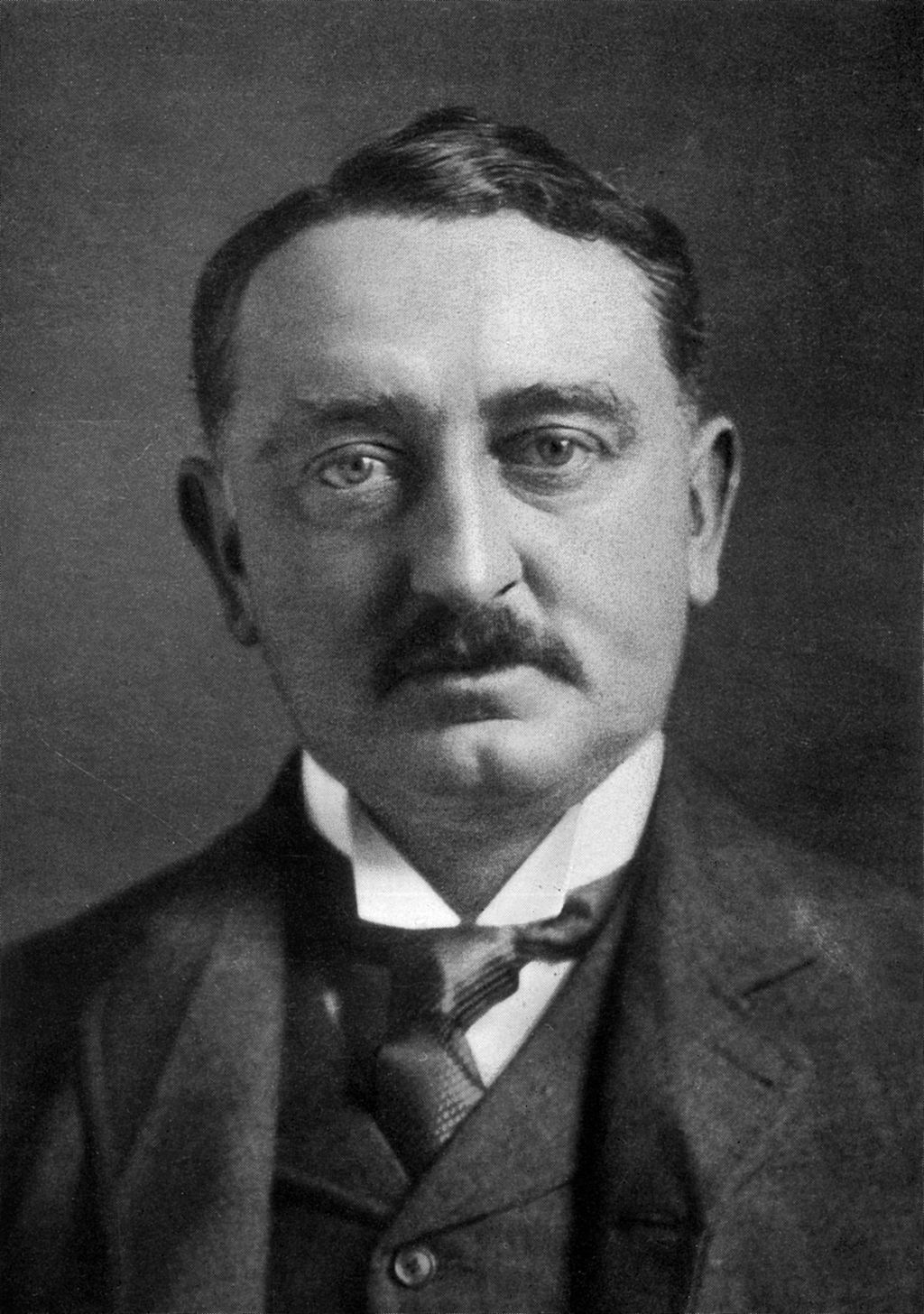
セシル・ローズ
Cecil Rhodes, 1853-1902

☆セシル・ジョン・ローズ(Cecil John Rhodes、/ˈsɛsəl ˈroʊdz/ SES-əl ROHDZ、1853年7月5日 - 1902年3月26日)は、1890年から1896年までケープ植民地の首相を務めた南アフリカの鉱業王であり政治家である。彼とブリティッシュ・サウス アフリカ・カンパニーは、南部アフリカの領土であるローデシア(現在のジンバブエとザンビア)を建国し、1895年にカンパニーはそれを彼にちなんで名付 けた。また、彼はイギリス領土を通る「ケープ・トゥ・カイロ鉄道」という構想を実現させるために多くの努力を傾けた。ローデスは、自身の遺産を財源とする ローデス奨学金を設立した。 牧師の息子として、ローズはハートフォードシャー州ビショップス・ストートフォードのネッツウェル・ハウスで生まれた。病弱だったローズは、気候が健康状 態を改善するかもしれないという期待から、17歳の時に家族によって南アフリカに送られた。1871年、18歳でキンバリーでダイヤモンド取引に参入し、 ロスチャイルド・アンド・カンパニーからの資金援助を受け、ダイヤモンド鉱山の買収と統合を計画的に開始した。 その後20年間にわたり、彼は世界のダイヤモンド市場をほぼ独占した。 1888年に設立された彼のダイヤモンド会社デ・ビアスは、21世紀の今日でもその地位を保っている。 ローズは1881年、27歳のときにケープ州議会に初当選し、1890年には首相に就任した。首相在任中、ローズはグレン・グレイ法により、政治的権力を 利用してアフリカ系黒人から土地を没収した。また、選挙権法により選挙権を得るために必要な資産を3倍に引き上げ、事実上、黒人の選挙参加を禁止した。 1890年代初頭にローデシアの形成を監督した後、1896年にポール・クルーガーの南アフリカ共和国(またはトランスヴァール)に対する無許可の攻撃で あるジェームソン襲撃の失敗により、辞任を余儀なくされた。ローデスのキャリアは回復することなく、心臓が弱り、長年の体調不良の末、1902年に死去し た。彼は現在のジンバブエに埋葬されたが、彼の墓は物議を醸す場所となっている。 彼は遺言で、世界最古の大学院奨学金である国際ローデス奨学金をオックスフォード大学に設立することを定めた。毎年102の大学院奨学金が支給されてい る。これまでに、マルタ、オーストラリア、カナダの首相、ビル・クリントン元アメリカ大統領など、多くの人々がこの奨学金の恩恵を受けている。 人種差別撤廃を求める国際的な動きが強まる中、ローズ・マスト・フォールなどの運動により、ローズの遺産は今日に至るまで議論の的となっている。批評家た ちは、ケープ植民地の黒人先住民から土地を没収したことや、グレート・ジンバブウェなどの南部アフリカの遺跡がヨーロッパ文明によって築かれたという誤っ た主張を挙げている。
| Cecil John Rhodes
(/ˈsɛsəl ˈroʊdz/ SES-əl ROHDZ; 5 July 1853 – 26 March 1902)[2] was an
English mining magnate and politician in southern Africa who served as
Prime Minister of the Cape Colony from 1890 to 1896. He and his British
South Africa Company founded the southern African territory of Rhodesia
(now Zimbabwe and Zambia), which the company named after him in 1895.
He also devoted much effort to realising his vision of a Cape to Cairo
Railway through British territory. Rhodes set up the Rhodes
Scholarship, which is funded by his estate. The son of a vicar, Rhodes was born at Netteswell House, Bishop's Stortford, Hertfordshire. A sickly child, he was sent to South Africa by his family when he was 17 years old in the hope that the climate might improve his health. He entered the diamond trade at Kimberley in 1871, when he was 18, and with funding from Rothschild & Co, began to systematically buy out and consolidate diamond mines. Over the next two decades he gained a near-complete monopoly of the world diamond market. His diamond company De Beers, formed in 1888, retains its prominence into the 21st century. Rhodes entered the Cape Parliament at the age of 27 in 1881,[3] and in 1890, he became prime minister. During his time as prime minister, Rhodes used his political power to expropriate land from black Africans through the Glen Grey Act, while also tripling the wealth requirement for voting under the Franchise and Ballot Act, effectively barring black people from taking part in elections.[4][5] After overseeing the formation of Rhodesia during the early 1890s, he was forced to resign in 1896 after the disastrous Jameson Raid, an unauthorised attack on Paul Kruger's South African Republic (or Transvaal). Rhodes's career never recovered; his heart was weak, and after years of ill health he died in 1902. He was buried in what is now Zimbabwe; his grave has been a controversial site. In his last will, he provided for the establishment of the international Rhodes Scholarship at Oxford University, the oldest graduate scholarship in the world. Every year it grants 102 full postgraduate scholarships. It has benefited prime ministers of Malta, Australia, Canada, United States President Bill Clinton, and many others. With the strengthening of international movements against racism, such as Rhodes Must Fall, Rhodes' legacy is a matter of debate to this day.[6] Critics cite his confiscation of land from the black indigenous population of the Cape Colony, and false claims that southern African archeological sites such as Great Zimbabwe were built by European civilisations.[7][8][9] |
セシル・ジョン・ローズ(Cecil John
Rhodes、/ˈsɛsəl ˈroʊdz/ SES-əl ROHDZ、1853年7月5日 -
1902年3月26日)は、1890年から1896年までケープ植民地の首相を務めた南アフリカの鉱業王であり政治家である。彼とブリティッシュ・サウス
アフリカ・カンパニーは、南部アフリカの領土であるローデシア(現在のジンバブエとザンビア)を建国し、1895年にカンパニーはそれを彼にちなんで名付
けた。また、彼はイギリス領土を通る「ケープ・トゥ・カイロ鉄道」という構想を実現させるために多くの努力を傾けた。ローデスは、自身の遺産を財源とする
ローデス奨学金を設立した。 牧師の息子として、ローズはハートフォードシャー州ビショップス・ストートフォードのネッツウェル・ハウスで生まれた。病弱だったローズは、気候が健康状 態を改善するかもしれないという期待から、17歳の時に家族によって南アフリカに送られた。1871年、18歳でキンバリーでダイヤモンド取引に参入し、 ロスチャイルド・アンド・カンパニーからの資金援助を受け、ダイヤモンド鉱山の買収と統合を計画的に開始した。 その後20年間にわたり、彼は世界のダイヤモンド市場をほぼ独占した。 1888年に設立された彼のダイヤモンド会社デ・ビアスは、21世紀の今日でもその地位を保っている。 ローズは1881年、27歳のときにケープ州議会に初当選し[3]、1890年には首相に就任した。首相在任中、ローズはグレン・グレイ法により、政治的 権力を利用してアフリカ系黒人から土地を没収した。また、選挙権法により選挙権を得るために必要な資産を3倍に引き上げ、事実上、黒人の選挙参加を禁止し た[4][ 1890年代初頭にローデシアの形成を監督した後、1896年にポール・クルーガーの南アフリカ共和国(またはトランスヴァール)に対する無許可の攻撃で あるジェームソン襲撃の失敗により、辞任を余儀なくされた。ローデスのキャリアは回復することなく、心臓が弱り、長年の体調不良の末、1902年に死去し た。彼は現在のジンバブエに埋葬されたが、彼の墓は物議を醸す場所となっている。 彼は遺言で、世界最古の大学院奨学金である国際ローデス奨学金をオックスフォード大学に設立することを定めた。毎年102の大学院奨学金が支給されてい る。これまでに、マルタ、オーストラリア、カナダの首相、ビル・クリントン元アメリカ大統領など、多くの人々がこの奨学金の恩恵を受けている。 人種差別撤廃を求める国際的な動きが強まる中、ローズ・マスト・フォールなどの運動により、ローズの遺産は今日に至るまで議論の的となっている。[6] 批評家たちは、ケープ植民地の黒人先住民から土地を没収したことや、グレート・ジンバブウェなどの南部アフリカの遺跡がヨーロッパ文明によって築かれたと いう誤った主張を挙げている。[7][8][9] |
| Origins Rhodes was born in 1853 in Bishop's Stortford, Hertfordshire, England, the fifth son of the Reverend Francis William Rhodes (1807–1878) and his wife, Louisa Peacock.[10] Francis was a Church of England clergyman who served as perpetual curate of Brentwood, Essex (1834–1843), and then as vicar of nearby Bishop's Stortford (1849–1876), where he was well known for never having preached a sermon longer than ten minutes.[11] Francis was the eldest son of William Rhodes (1774–1855), a brick manufacturer from Hackney, Middlesex. The family owned significant estates in London's Hackney and Dalston which Cecil would later inherit.[12] The earliest traceable direct ancestor of Cecil Rhodes is James Rhodes (fl. 1660) of Snape Green, Whitmore, Staffordshire.[13] Cecil's siblings included Frank Rhodes, a British Army officer. |
生い立ち ローズは1853年、イングランドのハートフォードシャー州ビショップス・ストートフォードで、牧師フランシス・ウィリアム・ローズ(1807年 - 1878年)とその妻ルイーザ・ピーコックの5番目の子として生まれた。フランシスはイングランド国教会の聖職者であり、 エセックス州ブレントウッドの牧師(1834年から1843年)を務め、その後、近隣のビショップス・ストートフォードの牧師(1849年から1876 年)を務めた。彼は10分以上説教をしたことがないことで有名であった。 フランシスは、ミドルセックス州ハックニー出身のレンガ製造業者ウィリアム・ローズ(1774年-1855年)の長男であった。ローズ家はロンドン・ハックニーとダルストンの広大な土地を所有しており、後にセシルがこれを相続することになる。 セシル・ローズの直接の先祖として最も古い記録が残っているのは、スタッフォードシャー州ウィットモアのスネイプ・グリーンに住んでいたジェームズ・ローズ(1660年頃)である。セシルの兄弟には、イギリス陸軍将校のフランク・ローズがいた。 |
| Childhood This section needs additional citations for verification. Please help improve this article by adding citations to reliable sources in this section. Unsourced material may be challenged and removed. (December 2016) (Learn how and when to remove this message) England and Jersey  Rhodes as a boy 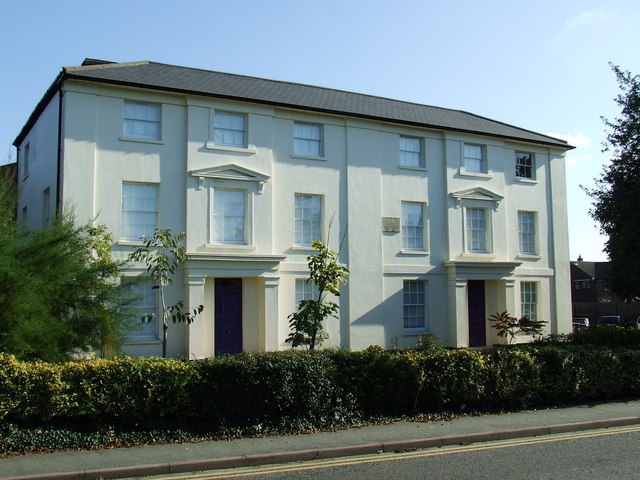 Rhodes' birthplace, now part of Bishop's Stortford Museum; the bedroom in which he was born is marked by a plaque. Rhodes attended the Bishop's Stortford Grammar School from the age of nine, but, as a sickly, asthmatic adolescent, he was taken out of grammar school in 1869 and, according to Basil Williams,[14][page needed] "continued his studies under his father's eye ..." At age seven, he was recorded in the 1861 census as boarding with his aunt, Sophia Peacock, at a boarding house in Jersey, where the climate was perceived to provide a respite for those with conditions such as asthma.[15] His health was weak and there were fears that he might be consumptive (have tuberculosis), a disease of which several of the family showed symptoms. His father decided to send him abroad for what were believed the good effects of a sea voyage and a better climate in South Africa. South Africa 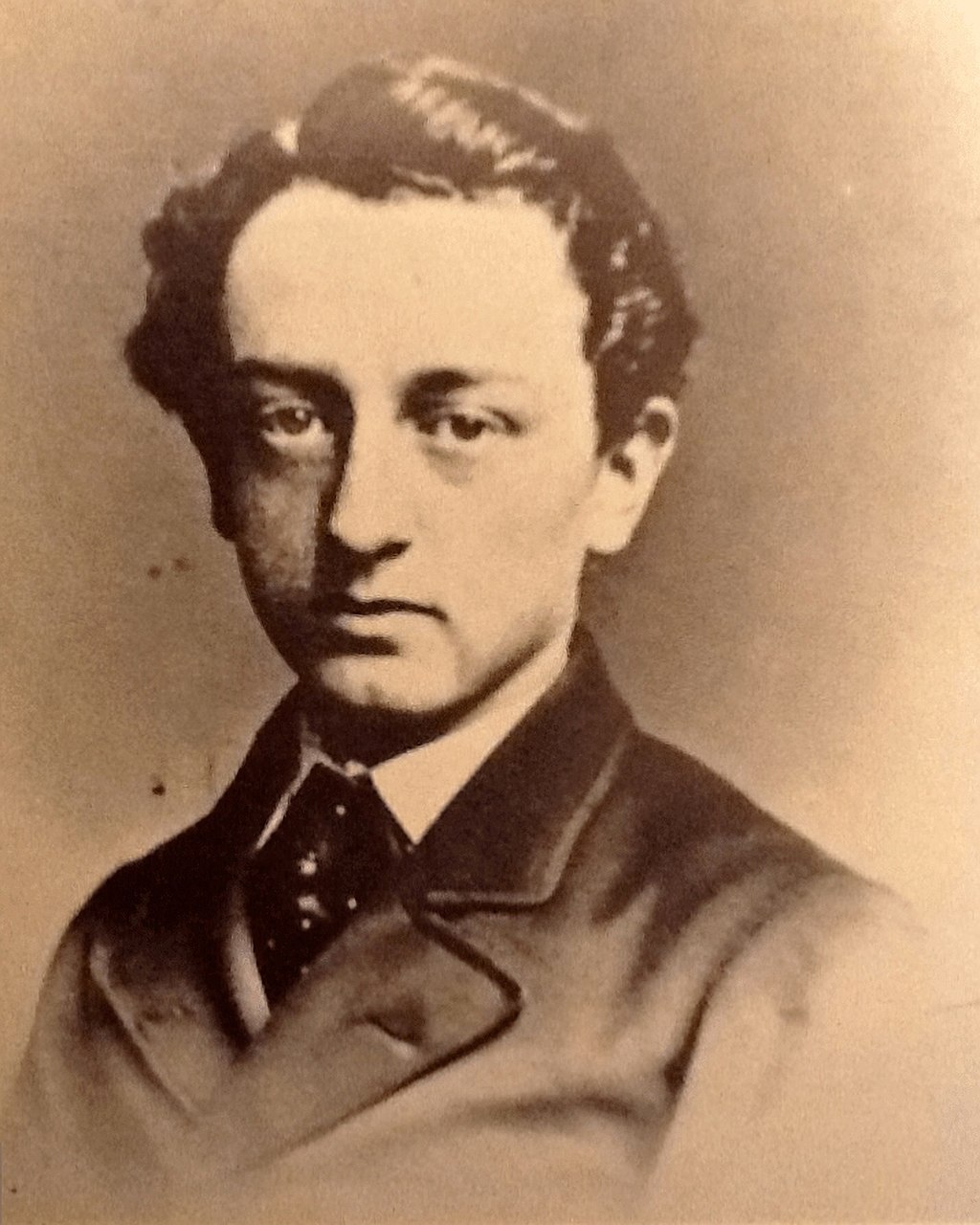 Rhodes at the age of sixteen When he arrived in Africa, Rhodes lived on money lent by his aunt Sophia.[16] After a brief stay with the Surveyor-General of Natal, P.C. Sutherland, in Pietermaritzburg, Rhodes took an interest in agriculture. He joined his brother Herbert on his cotton farm in the Umkomazi valley in Natal. The land was unsuitable for cotton, and the venture failed. In October 1871, 18-year-old Rhodes and his 26-year-old brother Herbert left the colony for the diamond fields of Kimberley in Northern Cape Province. Financed by N M Rothschild & Sons, Rhodes succeeded over the next 17 years in buying up all the smaller diamond mining operations in the Kimberley area. His monopoly of the world's diamond supply was sealed in 1890 through a strategic partnership with the London-based Diamond Syndicate. They agreed to control world supply to maintain high prices.[17][page needed][18][page needed] Rhodes supervised the working of his brother's claim and speculated on his behalf. Among his associates in the early days were John X. Merriman and Charles Rudd. Rudd later became his partner in the De Beers Mining Company and the Niger Oil Company. During the 1880s, Cape vineyards had been devastated by a phylloxera epidemic. The diseased vineyards were dug up and replanted, and farmers were looking for alternatives to wine. In 1892, Rhodes financed The Pioneer Fruit Growing Company at Nooitgedacht, a venture created by Harry Pickstone, an Englishman who had experience with fruit-growing in California.[19][page needed] The shipping magnate Percy Molteno had just undertaken the first successful refrigerated export to Europe. In 1896, after consulting with Molteno, Rhodes began to pay more attention to export fruit farming and bought farms in Groot Drakenstein, Wellington and Stellenbosch. A year later, he bought Rhone and Boschendal and commissioned Sir Herbert Baker to build him a cottage there.[19][page needed][20][page needed] The successful operation soon expanded into Rhodes Fruit Farms, and formed a cornerstone of the modern-day Cape fruit industry.[21] Education  A portrait bust of Rhodes on the first floor of No. 6 King Edward Street marks the place of his residence whilst in Oxford. In 1873, Rhodes left his farm field in the care of his business partner, Rudd, and sailed for England to study at university. He was admitted to Oriel College, Oxford, but stayed for only one term in 1874. He returned to South Africa and did not return for his second term at Oxford until 1876. He was greatly influenced by John Ruskin's inaugural lecture at Oxford, which reinforced his own attachment to the cause of British imperialism. Among his Oxford associates were James Rochfort Maguire, later a fellow of All Souls College and a director of the British South Africa Company, and Charles Metcalfe.[22] Due to his university career, Rhodes admired the Oxford tutorial system. Eventually, he was inspired to develop his scholarship scheme: "Wherever you turn your eye—except in science—an Oxford man is at the top of the tree".[23] While attending Oriel College, Rhodes became a Freemason in the Apollo University Lodge. Although initially he did not approve of the organisation, he continued to be a South African Freemason until his death in 1902. The shortcomings of the Freemasons, in his opinion, later caused him to envisage his own secret society with the goal of bringing the entire world under British rule.[24][page needed] |
幼少期 この節は検証可能な参考文献や出典が全く示されていないか、不十分です。この節の出典を追加して記事の信頼性向上にご協力ください。 出典の無い内容は、削除されることがあります。 (December 2016) (Learn how and when to remove this message) イングランドとジャージー  少年時代のローズ  ローズの生家は現在ビショップ・ストートフォード博物館の一部となっており、彼が生まれた寝室にはプレートが設置されている。 ローズは9歳からビショップ・ストートフォード・グラマースクールに通ったが、病弱で喘息持ちの思春期だったため、1869年にグラマースクールを退学となり、バジル・ウィリアムズによると、「父親の監督下で勉強を続けた」という。 7歳のとき、1861年の国勢調査では、ジャージーの寄宿舎で叔母のソフィア・ピーコックの家に下宿していると記録されている。この気候は喘息などの症状 を持つ人々にとって休息をもたらすと考えられていた。[15] 彼の健康状態は弱く、家族の何人かが症状を示していた結核(消耗性疾患)にかかっているのではないかという懸念があった。父親は、船旅と南アフリカの気候 が息子に良い影響を与えると考え、彼を海外に送ることを決めた。 南アフリカ  16歳の頃のローズ アフリカに到着したローズは、叔母のソフィアから借りた金で生活していた。[16] ナタール州の測量総監P.C.サザーランドのもとで短期間過ごした後、ローズは農業に興味を抱くようになった。 ナタール州のウムコマジ渓谷にある兄のハーバートの綿花農場に加わった。 その土地は綿花栽培には適しておらず、その事業は失敗に終わった。 1871年10月、18歳のローズと26歳の弟ハーバートは、植民地を離れ、北ケープ州キンバリー地方のダイヤモンド鉱山に向かった。 N M ロスチャイルド・アンド・サンズ社の融資を受け、ローズは17年間にわたってキンバリー地方の小規模なダイヤモンド採掘事業をすべて買収することに成功し た。 1890年には、ロンドンを拠点とするダイヤモンドシンジケートとの戦略的提携により、世界のダイヤモンド供給の独占権を確立した。彼らは、高価格を維持 するために世界の供給を管理することで合意した。[17][要出典][18][要出典] ローズは、弟の鉱区の作業を監督し、弟に代わって投機を行った。初期の頃の彼の協力者には、ジョン・X・メリマンとチャールズ・ラッドがいた。ラッドは後 にデ・ビアス鉱山会社とナイジェル石油会社のパートナーとなった。 1880年代、ケープのブドウ畑はフィロキセラの蔓延により壊滅的な被害を受けていた。病に侵されたブドウ畑は掘り起こされ、再植え付けが行われたが、農 民たちはワイン以外の代替品を探していた。1892年、ローズは、カリフォルニアでの果樹栽培の経験を持つイギリス人、ハリー・ピックストーンが立ち上げ た事業、ヌーイゲダクトのパイオニア果樹栽培会社に資金を提供した。[19][要ページ番号] 船主のパーシー・モルトノは、ヨーロッパへの冷蔵輸出を初めて成功させたばかりであった。1896年、モルトノの助言を受けて、ローズは果物の輸出に注目 し始め、グロート・ドラケンスタイン、ウェリントン、ステレンボッシュの農場を購入した。その1年後、ローヌとボスケンダルを購入し、サー・ハーバート・ ベイカーにコテージの建設を依頼した。[19][要出典][20][要出典] 事業は成功し、すぐにローデス・フルーツ・ファームに拡大し、現代のケープフルーツ産業の礎となった。[21] 教育  キング・エドワード・ストリート6番地の1階にあるローズの胸像は、オックスフォード在学中の彼の住居の跡地を示している。 1873年、ローズは共同経営者のラッドに農場を任せ、大学で学ぶためにイングランドへ向けて出帆した。彼はオックスフォード大学オリアン・カレッジに入 学したが、1874年の1学期しか在籍しなかった。南アフリカに戻った彼は、1876年までオックスフォードに戻らなかった。彼はオックスフォードでの ジョン・ラスキンの就任講演に大きな影響を受け、それがイギリス帝国主義への自身の愛着を強めることとなった。 オックスフォード時代の仲間には、後にオール・ソウルズ・カレッジのフェローとなり、ブリティッシュ・サウス・アフリカ・カンパニーの取締役となった ジェームズ・ロシュフォート・マグワイアや、チャールズ・メトカーフなどがいた。[22] 大学での経歴から、ローズはオックスフォードの個別指導システムを賞賛していた。最終的に、彼は奨学金制度を発展させることを思いついた。「目を向ける先 がどこであれ、科学を除いては、オックスフォードの出身者が頂点に立っている」[23] オライエル・カレッジ在学中、ローズはアポロ大学ロッジのフリーメイソンとなった。当初は組織を認めなかったものの、1902年に死去するまで南アフリカ のフリーメイソンであり続けた。フリーメイソンの欠点が、後に彼をして全世界を英国の支配下に置くことを目的とした独自の秘密結社を構想させることとなっ た、と彼は考えている。[24][要出典] |
Diamonds and the establishment of De Beers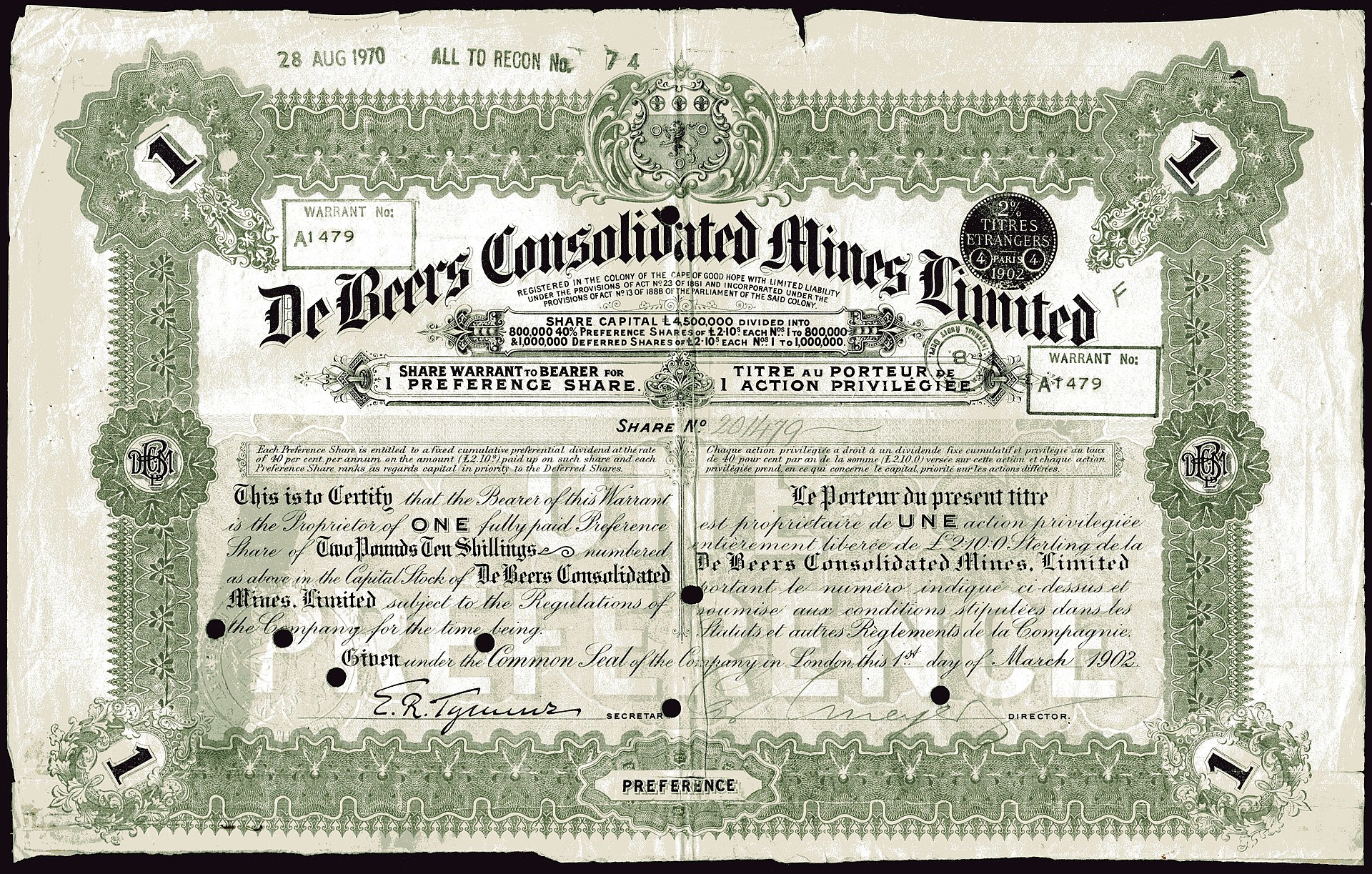 Preference Share of the De Beers Consolidated Mines Ltd., issued 1. March 1902 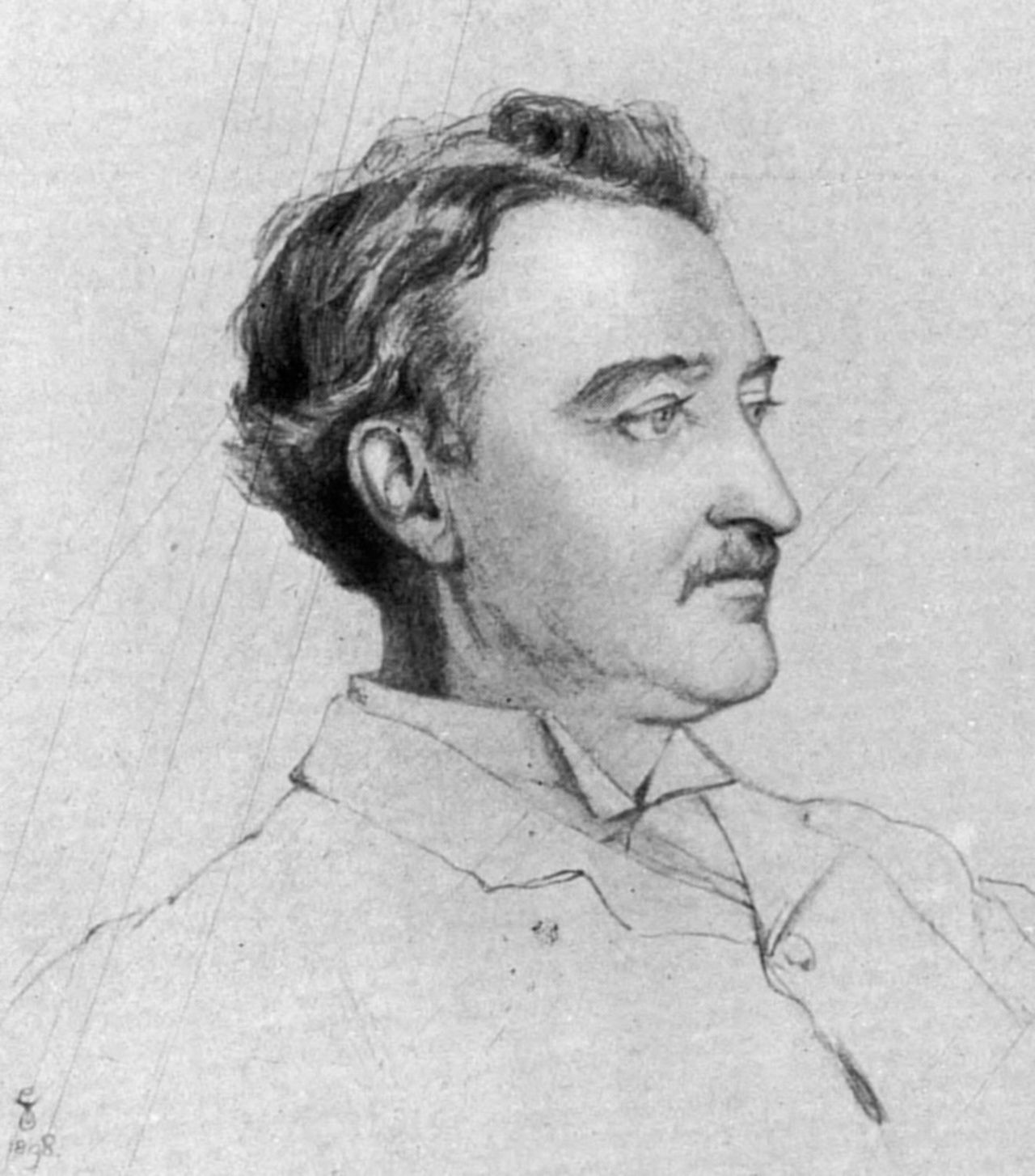 Sketch of Rhodes by Violet Manners During his years at Oxford, Rhodes continued to prosper in Kimberley. Before his departure for Oxford, he and C.D. Rudd had moved from the Kimberley Mine to invest in the more costly claims of what was known as old De Beers (Vooruitzicht). It was named after Johannes Nicolaas de Beer and his brother, Diederik Arnoldus, who occupied the farm.[25] After purchasing the land in 1839 from David Danser, a Koranna chief in the area, David Stephanus Fourie, forebear of Claudine Fourie-Grosvenor, had allowed the de Beers and various other Afrikaner families to cultivate the land. The region extended from the Modder River via the Vet River up to the Vaal River.[26][page needed] In 1874 and 1875, the diamond fields were in the grip of depression, but Rhodes and Rudd were among those who stayed to consolidate their interests. They believed that diamonds would be numerous in the hard blue ground that had been exposed after the softer, yellow layer near the surface had been worked out. During this time, the technical problem of clearing out the water that was flooding the mines became serious. Rhodes and Rudd obtained the contract for pumping water out of the three main mines. After Rhodes returned from his first term at Oxford, he lived with Robert Dundas Graham, who later became a mining partner with Rudd and Rhodes.[27] On 13 March 1888, Rhodes and Rudd launched De Beers Consolidated Mines after the amalgamation of a number of individual claims. With £200,000 of capital, the company, of which Rhodes was secretary, owned the largest interest in the mine (£200,000 in 1880 = £22.5m in 2020 = $28.5m USD).[28] Rhodes was named the chairman of De Beers at the company's founding in 1888. De Beers was established with funding from N.M. Rothschild & Sons in 1887.[a] |
ダイヤモンドとデ・ビアス社の設立 1902年3月1日発行のデ・ビアス統合鉱山株式会社優先株  バイオレット・マナーズによるローデスのスケッチ オックスフォード在学中も、ローデスはキンバリーで成功を収め続けた。オックスフォードへ出発する前に、C.D.ラッドとともにキンバリー鉱山から、より 採掘コストの高い旧デ・ビアス(Vooruitzicht)と呼ばれる鉱区に投資した。この鉱区は、ヨハネス・ニコラス・デ・ビールと彼の兄弟ディディエ リク・アーノルドゥスが農場を所有していたことにちなんで名付けられた。 1839年に、この地域のコランナ族の族長であったデイヴィッド・ダンスラーから土地を購入したデイヴィッド・ステファヌス・フーリー(クロディーヌ・ フーリー・グロスヴェノーの祖先)は、デ・ビアス家をはじめとするアフリカーナーのさまざまな家族にその土地の開拓を許可した。その地域はモッダー川から ヴェット川を経てヴァール川まで広がっていた。 1874年と1875年には、ダイヤモンド鉱山は不況の渦中にあったが、ローズとラッドは利益を確保するために留まった。彼らは、地表近くの柔らかい黄色 の層が掘り尽くされた後に露出した硬い青色の地層に、ダイヤモンドが豊富にあると信じていた。この時期、鉱山を浸水させていた水を排除するという技術的な 問題が深刻化した。ローズとラッドは、3つの主要鉱山の排水契約を獲得した。ローズがオックスフォード大学での最初の任期を終えて帰国した後、彼は後に ラッドとローズの鉱山パートナーとなるロバート・ダンダス・グラハムと暮らすようになった。 1888年3月13日、ローズとラッドは、複数の個々の鉱区の合併を経て、デ・ビアス鉱山会社を設立した。資本金20万ポンドで、ローズが秘書を務める同 社は、その鉱山で最大の権益を所有していた(1880年の20万ポンドは、2020年には2,250万ポンド、2850万米ドルに相当する)。[28] ローズは1888年の創業時にデ・ビアスの会長に就任した。デ・ビアスは1887年にN.M.ロスチャイルド・アンド・サンズからの出資を受けて設立され た。[a] |
Politics in South Africa Cecil Rhodes (Sketch by Mortimer Menpes) This section needs additional citations for verification. Please help improve this article by adding citations to reliable sources in this section. Unsourced material may be challenged and removed. (September 2014) (Learn how and when to remove this message) In 1880, Rhodes prepared to enter public life at the Cape. With the earlier incorporation of Griqualand West into the Cape Colony under the Molteno Ministry in 1877, the area had obtained six seats in the Cape House of Assembly. Rhodes chose the rural and predominately Boer constituency of Barkly West, which would remain loyal to Rhodes until his death.[30] When Rhodes became a member of the Cape Parliament, the chief goal of the assembly was to help decide the future of Basutoland.[10] The ministry of Sir Gordon Sprigg was trying to restore order after the 1880 rebellion known as the Gun War. The Sprigg ministry had precipitated the revolt by applying its policy of disarming all native Africans to those of the Basotho nation, who resisted. In 1890, Rhodes became Prime Minister of the Cape Colony. He introduced various Acts of Parliament to push black people from their lands and make way for industrial development. Rhodes's view was that black people needed to be driven off their land to "stimulate them to labour" and to change their habits.[31] "It must be brought home to them", Rhodes said, "that in future nine-tenths of them will have to spend their lives in manual labour, and the sooner that is brought home to them the better."[31] In 1892, Rhodes's Franchise and Ballot Act raised the property requirements from a relatively low £25 to a significantly higher £75 which had a disproportionate effect on the previously growing number of enfranchised black people in the Cape under the Cape Qualified Franchise that had been in force since 1853.[32] By limiting the amount of land which black Africans were legally allowed to hold in the Glen Grey Act of 1894, Rhodes further disenfranchised the black population. To quote Richard Dowden, most would now "find it almost impossible to get back on the list because of the legal limit on the amount of land they could hold".[33] In addition, Rhodes was an early architect of the Natives Land Act, 1913, which would limit the areas of the country where black Africans were allowed to settle to less than 10%.[34] At the time, Rhodes would argue that "the native is to be treated as a child and denied the franchise. We must adopt a system of despotism, such as works in India, in our relations with the barbarism of South Africa."[35] Rhodes also introduced educational reform to the area. His policies were instrumental in the development of British imperial policies in South Africa, such as the Hut tax. 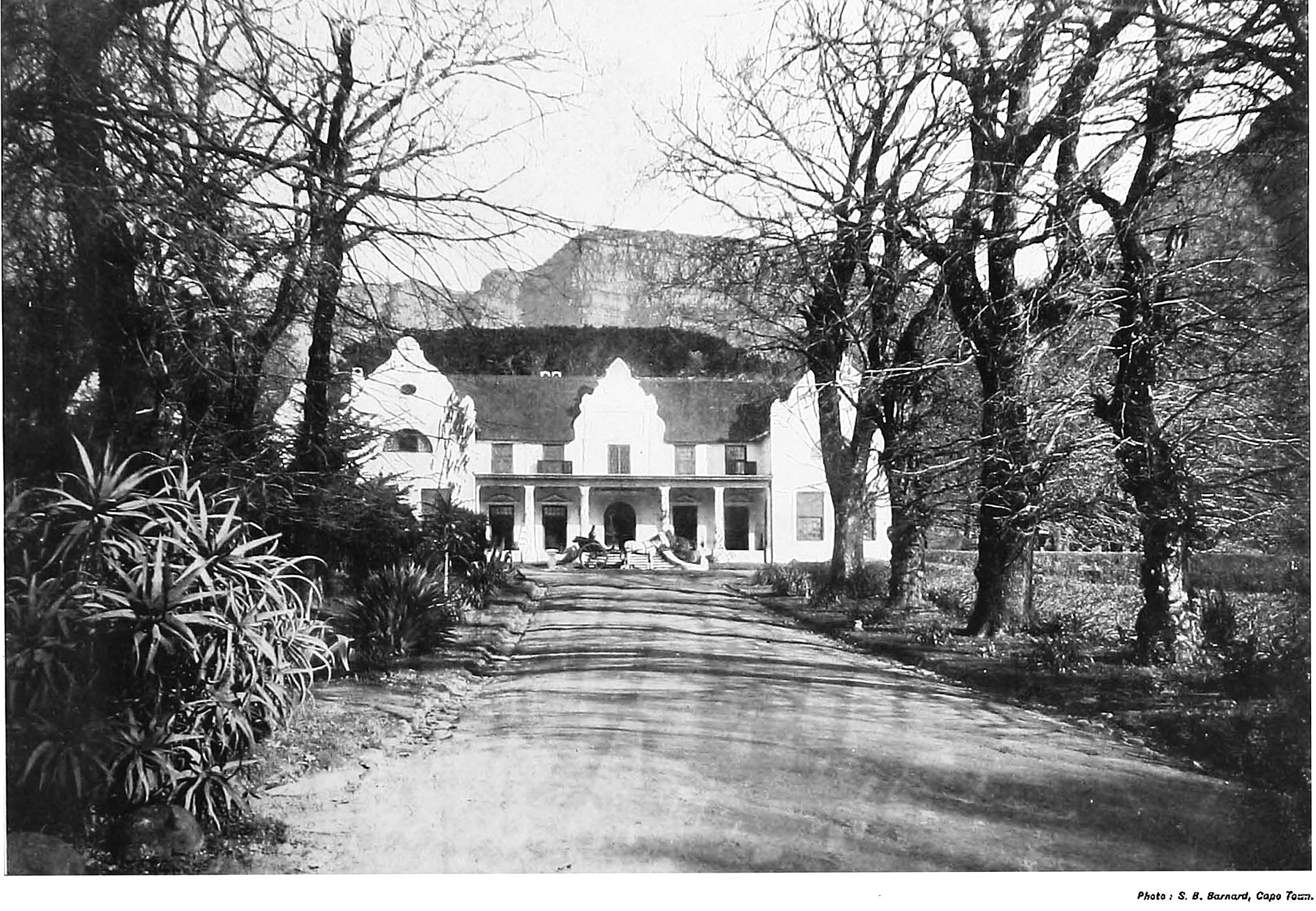 Groote Schuur in 1899, Rhode's home in Cape Town at the time. Rhodes did not, however, have direct political power over the independent Boer Republic of the Transvaal.[citation needed][36] He often disagreed with the Transvaal government's policies, which he considered unsupportive of mine-owners' interests. In 1895, believing he could use his influence to overthrow the Boer government,[10] Rhodes supported the Jameson Raid, an unsuccessful attempt to create an uprising in the Transvaal that had the tacit approval of Secretary of State for the Colonies Joseph Chamberlain.[37] The raid was a catastrophic failure. It forced Cecil Rhodes to resign as Prime Minister of the Cape Colony, sent his oldest brother Col. Frank Rhodes to jail in Transvaal convicted of high treason and nearly sentenced to death, and contributed to the outbreak of the Second Boer War. In 1899, Rhodes was sued by a man named Burrows for falsely representing the purpose of the raid and thereby convincing him to participate in the raid. Burrows was severely wounded and had to have his leg amputated. His suit for £3,000 in damages was successful.[38] |
南アフリカの政治 セシル・ローズ(モートマー・メンペスによるスケッチ この節では検証可能な参考文献や出典が全く示されていないか、不十分です。出典を追加して記事の信頼性向上にご協力ください。 出典の記載がない項目は、削除される場合があります。 (2014年9月) (Learn how and when to remove this message) 1880年、ローズはケープ州での公職就任の準備を整えた。1877年のモルテーノ内閣下でグリクワランド・ウェストがケープ植民地に編入されたことによ り、この地域はケープ州議会で6議席を獲得した。ローズはバークリー・ウェストの農村地帯で、主にボーア人が住む選挙区を選んだ。この選挙区はローズの死 までローズに忠誠を誓い続けた。 ローズがケープ州議会の一員となったとき、議会の主な目的はバストランドの将来を決めることだった。[10] ゴードン・スプリッグ卿の政権は、1880年の銃戦争として知られる反乱の後、秩序を回復しようとしていた。 スプリッグ政権は、バストランドの政策をアフリカ人すべてに適用し、抵抗したバストランドの人々を武装解除したことで、反乱を招いた。 1890年、ローズはケープ植民地の首相となった。彼は議会でさまざまな法案を提出し、黒人たちを土地から追い出して工業開発の余地を作ることを推進し た。ローズの考えでは、黒人たちを土地から追い出すことで「労働意欲をかき立て」、彼らの習慣を変える必要があった。「彼らに将来、彼らの10分の9が肉 体労働に従事しなければならないことを理解させなければならない。そして、そのことを彼らに早く理解させるほど良い」とローズは述べた。 1892年、ローズの選挙権および投票法は、財産要件を比較的低い25ポンドから大幅に高い75ポンドに引き上げた。これは、1853年から施行されてい たケープ有資格選挙権法の下で、それまで増加傾向にあったケープの黒人の選挙権保有者数に不釣り合いな影響を与えた 1853年から施行されていたケープ有資格選挙法の下で、それまで増加傾向にあったケープ州の黒人の選挙権保有者数に不均衡な影響を与えた。[32] 1894年のグレン・グレイ法によって、アフリカ系黒人が合法的に所有できる土地の面積を制限することで、ローズはさらに黒人人口の選挙権を剥奪した。リ チャード・ダウデン(Richard Dowden)の言葉を借りれば、ほとんどの人は「所有できる土地の面積に法的制限があるため、名簿に再び載ることはほぼ不可能」である。[33] さらに、ローズは1913年の「原住民土地法」の初期の立案者の一人であり、 1913年に制定されたこの法律は、アフリカ系黒人が居住を許される地域の割合を10%未満に制限するものであった。[34] 当時、ローズは「原住民は子供として扱われ、選挙権を否定されるべきである。南アフリカの野蛮性との関係においては、インドで実施されているような専制政 治のシステムを採用しなければならない」と主張していた。[35] ローズはまた、その地域に教育改革をもたらした。彼の政策は、小屋税(Hut tax)など、南アフリカにおける英国帝国政策の発展に貢献した。  1899年、ローズの当時のケープタウンの自宅であるグロート・シュール しかし、ローズは独立したボーア共和国トランスヴァールに対して直接的な政治的権力を持っていなかった。[要出典][36] 彼はトランスヴァール政府の政策にしばしば反対し、それは鉱山所有者の利益を支持しないものだと考えていた。1895年、彼は自らの影響力を利用してボー ア人政府を転覆させることができると信じ、[10] ジェイムソン襲撃事件を支援した。これは、トランスヴァールで蜂起を起こそうとしたものの失敗したもので、植民地大臣ジョゼフ・チェンバレンの暗黙の承認 を得ていた。[37] この襲撃は大失敗に終わった。この事件により、セシル・ローズはケープ植民地首相を辞任し、彼の長兄であるフランク・ローズ大佐は反逆罪でトランスヴァー ル共和国の刑務所に収監され、死刑寸前まで追い込まれた。また、この事件は第二次ボーア戦争の勃発の一因ともなった。 1899年、ローズは、襲撃の目的を偽って彼を説得し、襲撃に参加させたとして、バロウズという男に訴えられた。バロウズは重傷を負い、足を切断しなければならなかった。3,000ポンドの損害賠償を求める訴えは成功した。[38] |
| Expanding the British Empire Rhodes and the Imperial Factor  "The Rhodes Colossus" – a cartoon by Edward Linley Sambourne, published in Punch after Rhodes announced plans for a railway connection and telegraph line from Cape Town to Cairo in 1892. Rhodes used his wealth and that of his business partner Alfred Beit and other investors to pursue his dream of creating a British Empire in new territories to the north by obtaining mineral concessions from the most powerful indigenous chiefs. Rhodes' competitive advantage over other mineral prospecting companies was his combination of wealth and astute political instincts, also called the "imperial factor," as he often collaborated with the British Government. He befriended its local representatives, the British Commissioners, and through them organized British protectorates over the mineral concession areas via separate but related treaties. In this way he obtained both legality and security for mining operations. He could then attract more investors. Imperial expansion and capital investment went hand in hand.[39][40] The imperial factor was a double-edged sword: Rhodes did not want the bureaucrats of the Colonial Office in London to interfere in the Empire in Africa. He wanted British settlers and local politicians and governors to run it. This put him on a collision course with many in Britain, as well as with British missionaries, who favoured what they saw as the more ethical direct rule from London. Rhodes prevailed because he would pay the cost of administering the territories to the north of South Africa against his future mining profits. The Colonial Office did not have enough funding for this. Rhodes promoted his business interests as in the strategic interest of Britain: preventing the Portuguese, the Germans or the Boers from moving into south-central Africa. Rhodes's companies and agents cemented these advantages by obtaining many mining concessions, as exemplified by the Rudd and Lochner Concessions.[39] Treaties, concessions and charters Rhodes had already tried and failed to get a mining concession from Lobengula, King of the Ndebele of Matabeleland. In 1888 he tried again. He sent John Smith Moffat, son of the missionary Robert Moffat, who was trusted by Lobengula, to persuade the latter to sign a treaty of friendship with Britain, and to look favourably on Rhodes's proposals. His associate Charles Rudd, together with Francis Thompson and Rochfort Maguire, assured Lobengula that no more than ten white men would mine in Matabeleland. This limitation was left out of the document, known as the Rudd Concession, which Lobengula signed. Furthermore, it stated that the mining companies could do anything necessary to their operations. When Lobengula discovered later the true effects of the concession, he tried to renounce it, but the British Government ignored him.[39] During the company's early days, Rhodes and his associates set themselves up to make millions (hundreds of millions in current pounds) over the coming years through what has been described as a "suppressio veri ... which must be regarded as one of Rhodes's least creditable actions".[41] Contrary to what the British government and the public had been allowed to think, the Rudd Concession was not vested in the British South Africa Company, but in a short-lived ancillary concern of Rhodes, Rudd and a few others called the Central Search Association, which was quietly formed in London in 1889. This entity renamed itself the United Concessions Company in 1890, and soon after sold the Rudd Concession to the Chartered Company for 1,000,000 shares. When Colonial Office functionaries discovered this chicanery in 1891, they advised Secretary of State for the Colonies Viscount Knutsford to consider revoking the concession, but no action was taken.[41] Armed with the Rudd Concession, in 1889 Rhodes obtained a charter from the British Government for his British South Africa Company (BSAC) to rule, police, and make new treaties and concessions from the Limpopo River to the great lakes of Central Africa. He obtained further concessions and treaties north of the Zambezi, such as those in Barotseland (the Lochner Concession with King Lewanika in 1890, which was similar to the Rudd Concession); and in the Lake Mweru area (Alfred Sharpe's 1890 Kazembe concession). Rhodes also sent Sharpe to get a concession over mineral-rich Katanga, but met his match in ruthlessness: when Sharpe was rebuffed by its ruler Msiri, King Leopold II of Belgium obtained a concession over Msiri's dead body for his Congo Free State.[40] Rhodes also wanted Bechuanaland Protectorate incorporated in the BSAC charter. But three Tswana kings, including Khama III, travelled to Britain and won over British public opinion for it to remain governed by the British Colonial Office in London. Rhodes commented: "It is humiliating to be utterly beaten by these niggers."[39] The British Colonial Office also decided to administer British Central Africa owing to[clarification needed] the activism of David Livingstone trying to end the East African Arab-Swahili slave trade. Rhodes paid much of the cost so that the British Central Africa Commissioner Sir Harry Johnston, and his successor Alfred Sharpe, would assist with security for Rhodes in the BSAC's north-eastern territories. Johnston shared Rhodes's expansionist views, but he and his successors were not as pro-settler as Rhodes, and disagreed on dealings with Africans. Rhodesia Main article: Company rule in Rhodesia 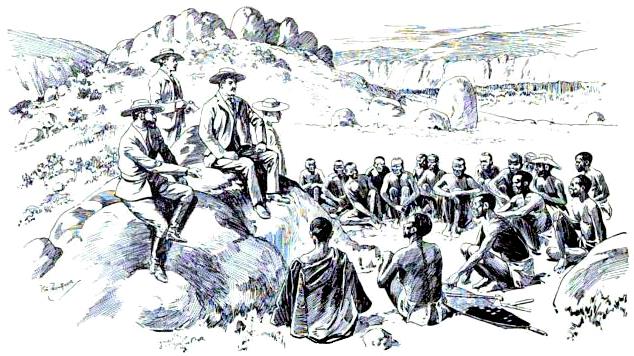 Rhodes and the Ndebele izinDuna make peace in the Matopos Hills, as depicted by Robert Baden-Powell, 1896 The BSAC had its own police force, the British South Africa Police, which was used to control Matabeleland and Mashonaland, in present-day Zimbabwe.[42] The company had hoped to start a "new Rand" from the ancient gold mines of the Shona. Because gold deposits weren't as plentiful as they had hoped, many of the white settlers who accompanied the BSAC to Mashonaland became farmers rather than miners. White settlers and their locally-employed Native Police engaged in widespread indiscriminate rape of Ndebele women in the early 1890s.[43] The Ndebele and the Shona—the two main, but rival, peoples—took advantage of the absence of most of the BSAP for the Jameson Raid in January 1896; they separately rebelled against the coming of the European settlers, and the BSAC defeated them in the Second Matabele War. Rhodes went to Matabeleland after his resignation as Cape Colony Premier, and appointed himself Colonel in his own column of irregular troops moving from Salisbury to Bulawayo to relieve the siege of whites there. He remained Managing Director of the BSAC (with power of attorney to take decisions without reference back to the Board in London) until June 1896, defying Chamberlain's calls to resign, and he gave instructions that no mercy be shown in putting down the rebellion, telling officers that "Your instructions are" he told a major, to "do the most harm you can to the natives around you."[44] He ordered a police officer to "kill all you can", even those Ndebele who begged for mercy and threw down their arms.[45] Shortly after learning of the assassination of the Ndebele spiritual leader, Mlimo, by the American scout Frederick Russell Burnham, and after participating in the cavalry charge at one of the last pitched battles of this phase of the war, Rhodes' associate Johan Colenbrander arranged for a meeting with the remaining Ndebele chiefs. Rhodes and a few colleagues walked unarmed into the Ndebele stronghold in Matobo Hills.[46] In a series of meetings between August and October, he persuaded the Impi to lay down their arms, thus ending the Second Matabele War.[47] In the aftermath of the war in Matabeleland, but whilst the uprising in Mashonaland was being suppressed, Rhodes returned to London to give evidence to the UK House of Commons Select Committee of Enquiry into the Jameson Raid. As Rhodes had incriminating telegrams demonstrating the complicity and foreknowledge of the Raid by Joseph Chamberlain, the Colonial Secretary, he and his solicitor were able to blackmail Chamberlain into retaining the BSAC Charter, leaving the Company in charge of administering the territory north of the Limpopo even as it became a Crown colony.[48] Rhodes returned to Mashonaland, further overseeing the suppression of the uprising there into 1897. The scandal attached to his name did not prevent him rejoining the board of the BSAC in 1898. He remained an MP in the Cape Parliament and a Privy Councillor. By the end of 1894, the territories over which the BSAC had concessions or treaties, collectively called "Zambesia" after the Zambezi River flowing through the middle, comprised an area of 1,143,000 km2 between the Limpopo River and Lake Tanganyika. In May 1895, its name was officially changed to "Rhodesia", reflecting Rhodes's popularity among settlers who had been using the name informally since 1891. The designation Southern Rhodesia was officially adopted in 1898 for the part south of the Zambezi, which later became Zimbabwe; and the designations North-Western and North-Eastern Rhodesia were used from 1895 for the territory which later became Northern Rhodesia, then Zambia.[49][50] He built a house for himself in 1897 in Bulawayo.  "Empire Makers and Breakers" depicted by Henry Wright, showing a scene at the South Africa Committee in 1897. Left to right: Her Majesty's Attorney-General Richard Webster, Henry Labouchère (remembered for the Labouchère Amendment, which for the first time criminalised all male homosexual activity), Cecil Rhodes, 'The Squire of Malwood' William Harcourt, and Joseph Chamberlain. Rhodes decreed in his will that he was to be buried in Matopos Hills (now Matobo Hills). After his death in the Cape in 1902, his body was transported by train to Bulawayo. His burial was attended by Ndebele chiefs, now paid agents of the BSAC administration, who asked that the firing party should not discharge their rifles as this would disturb the spirits. Then, for the first time, they gave a white man the Matabele royal salute, Bayete. Rhodes is buried alongside Leander Starr Jameson and 34 British soldiers killed in the Shangani Patrol.[51] Despite occasional efforts to return his body to the United Kingdom, his grave remains there still, "part and parcel of the history of Zimbabwe" and attracts thousands of visitors each year.[52] "Cape to Cairo Red Line" 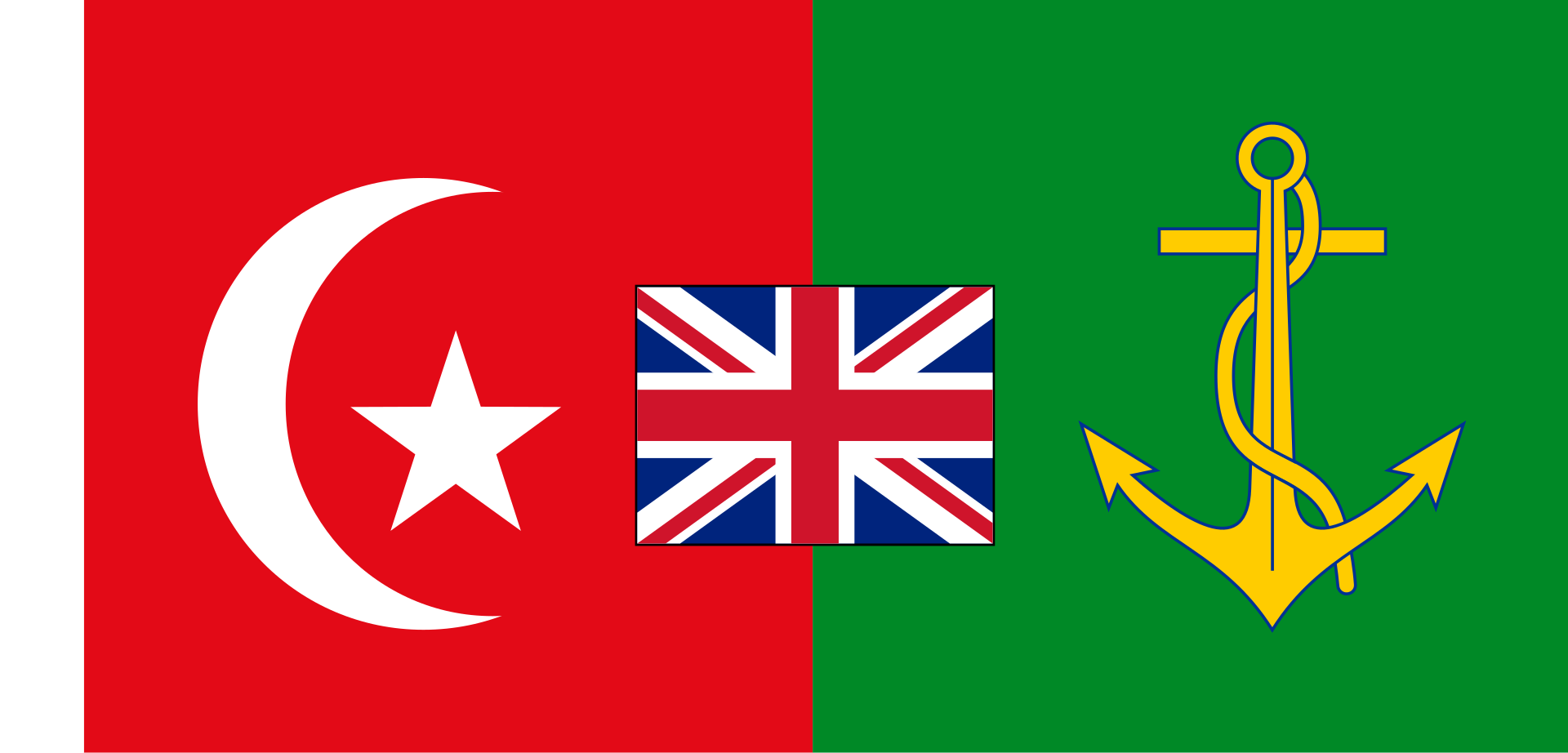 Rhodes' personal flag symbolising his "Cape to Cairo" dream 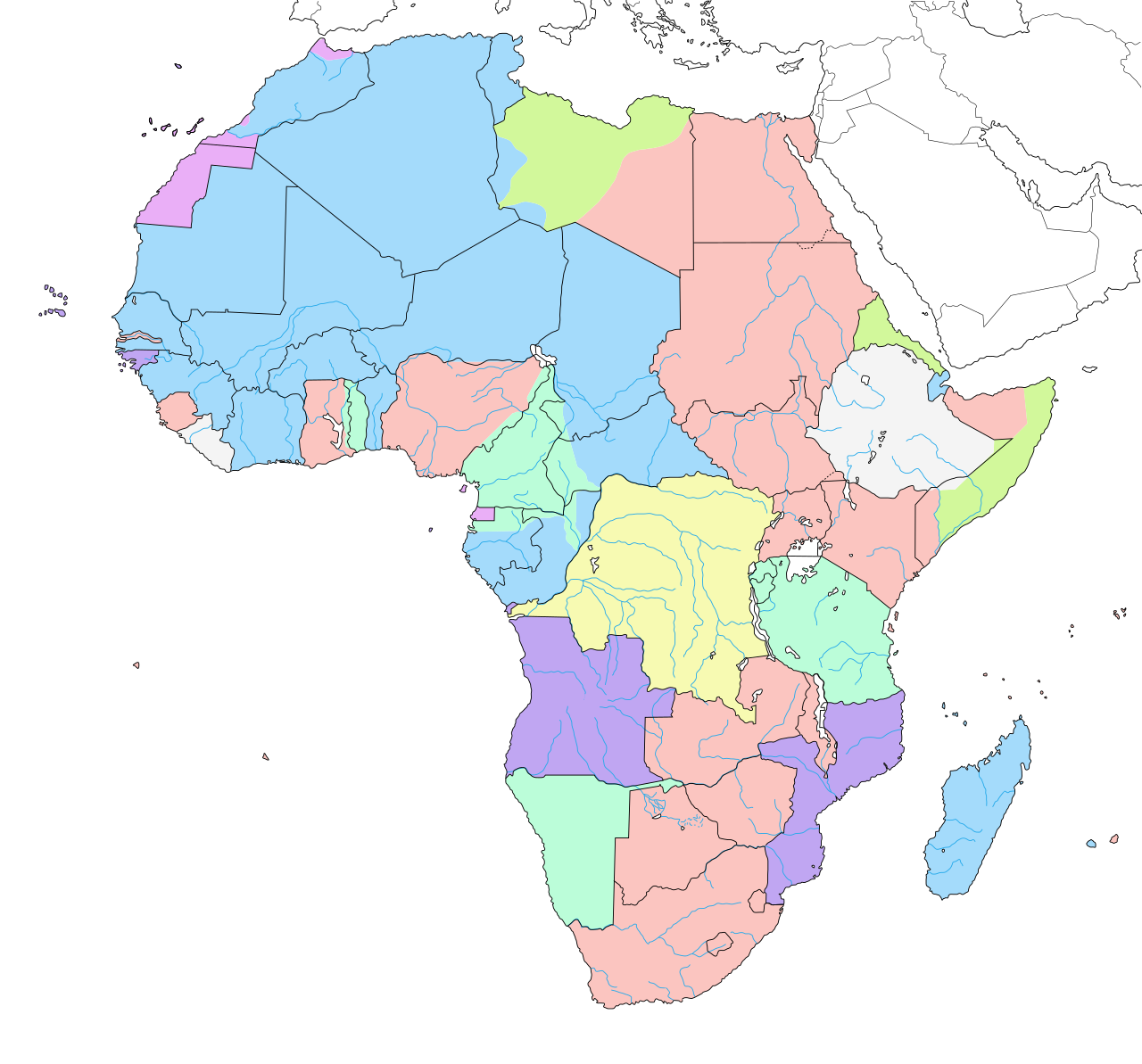 Map showing almost complete British control of the Cape to Cairo route, 1913 British control Main articles: Cape to Cairo Railway and Cape to Cairo Road One of Rhodes's dreams was for a "red line" on the map from the Cape to Cairo (on geo-political maps, British dominions were always denoted in red or pink). Rhodes had been instrumental in securing southern African states for the Empire. He and others felt the best way to "unify the possessions, facilitate governance, enable the military to move quickly to hot spots or conduct war, help settlement, and foster trade" would be to build the "Cape to Cairo Railway".[53] This enterprise was not without its problems. France had a conflicting strategy in the late 1890s to link its colonies from west to east across the continent[54] and the Portuguese produced the "Pink Map",[55] representing their claims to sovereignty in Africa. Ultimately, Belgium and Germany proved to be the main obstacles to the British objective until the United Kingdom conquered and seized Tanganyika from the Germans as a League of Nations mandate in World War I.[56] |
大英帝国の拡大 ローズス島と帝国の要因  「ローズスのコロッサス」 - 1892年にローズスがケープタウンからカイロまでの鉄道と電信線の建設計画を発表した後、エドワード・リンリー・サンボーンが『パンチ』誌に発表した漫画。 ローズスは、自身の富とビジネスパートナーであるアルフレッド・ベイト、そして他の投資家の富を投じて、最も有力な土着の首長から鉱物採掘権を獲得し、新 たな領土を北に広げて大英帝国を築くという夢を追い求めた。他の鉱物探査会社に対するローズの競争優位性は、その富と鋭い政治的直感の組み合わせであり、 それは「帝国の要素」とも呼ばれ、しばしば英国政府と協力した。彼は現地の代表者である英国の委員と親交を結び、彼らを通じて、個別の関連条約を通じて鉱 物利権地域に英国の保護領を組織した。このようにして、彼は採掘事業の合法性と安全性の両方を確保した。これにより、より多くの投資家を惹きつけることが できた。帝国の拡大と資本投資は、両輪の関係であった。[39][40] 帝国ファクターは諸刃の剣であった。ローズは、ロンドンの植民地省の官僚がアフリカ帝国に干渉することを望まなかった。彼は、英国の入植者や地元の政治 家、知事に運営を任せたかったのである。このため、彼は英国の多くの人々、そして英国の宣教師たちと対立するようになった。宣教師たちは、ロンドンからの 倫理的な直接統治を支持していた。ローズは、南アフリカ北部の領土の管理費用を、将来の採掘利益から支払うことを約束したため、勝利を収めた。植民地省に は、このための十分な資金がなかった。ローズは、ポルトガル人、ドイツ人、ボーア人によるアフリカ中南部への進出を阻止することが、英国の戦略的利益につ ながるとして、自身の事業利益を推進した。ローズの会社と代理人は、ラッド鉱区やロクナー鉱区の例に見られるように、多くの採掘権を獲得することで、これ らの利点を確固たるものにした。 条約、利権、憲章 ローデスはすでに、マトベレランドのンデベレ族の王ロベンガラから鉱業利権を得ようとして失敗していた。1888年、彼は再び挑戦した。彼は、宣教師ロ バート・モファットの息子で、ロベンガラから信頼されていたジョン・スミス・モファットを派遣し、英国との友好条約に署名し、ローデスの提案に好意的な態 度を取るよう説得させた。彼の協力者チャールズ・ラッドは、フランシス・トンプソンとロクフォート・マグワイアとともに、ロベンガラに、マタベレランドで 採掘を行う白人は10人以下であると保証した。この制限は、ラッド利権として知られる文書には記載されず、ロベンガラが署名した。さらに、その文書には、 採掘会社は事業に必要なことは何でもできると記載されていた。後にロベンガラがこの特権の真の影響を知ると、彼はこれを破棄しようとしたが、英国政府はこ れを無視した。[39] 会社設立当初、ローズと彼の仲間たちは、今後数年間で数百万ポンド(現在の貨幣価値で数億ポンド)を稼ぐ計画を立てていた。これは「真実の隠蔽」と表現さ れ、「ローズの最も信用できない行動のひとつ」とみなされている。[41] 英国政府と国民が考えていたこととは逆に、ラッド利権は英国南アフリカ会社に与えられたものではなく、1889年にロンドンでひっそりと設立された、ロッ ズ、ラッド、そして数人の他の者たちによる短命な関連会社、セントラル・サーチ・アソシエーションに与えられたものだった。この団体は1890年に社名を ユナイテッド・コンセッション・カンパニーに変更し、その後すぐに、100万株の株式と引き換えにラッド利権をチャータード・カンパニーに売却した。 1891年に植民地省の役人がこのごまかしを発見すると、植民地大臣のナッツフォード子爵に利権の取り消しを検討するよう助言したが、何の措置も取られな かった。 ラッド利権を手に入れたローズは、1889年に英国政府から、リムポポ川から中央アフリカの大きな湖までの地域を統治し、警察を配置し、新たな条約や利権 を獲得するための認可を、英国南アフリカ会社(BSAC)に与えた。彼はさらに、ザンベジ川の北にあるバロツェランド(1890年のルワニカ王とのロッ チャー譲歩はラッド譲歩に類似)やムウェル湖地域(1890年のアルフレッド・シャープのカゼンベ譲歩)などの譲歩や条約を獲得した。また、ローデスは シャープを鉱物資源が豊富なカタンガの利権獲得に派遣したが、冷酷さにおいてシャープに敵わなかった。シャープが支配者ムシリに拒絶されたとき、ベルギー 王レオポルド2世はムシリの死体を利用してコンゴ自由国の利権を獲得した。 ローデスはまた、ベチュアナランド保護領をBSACの憲章に組み込むことを望んでいた。しかし、カーマ3世を含むツワナ族の3人の王が英国を訪問し、ロン ドンの英国植民地省による統治を維持するよう英国世論を動かした。ローズは「これらのニガーに完膚なきまでに打ち負かされるのは屈辱的だ」とコメントし た。[39] また、英国植民地省は、東アフリカのアラブ・スワヒリ人による奴隷貿易を終わらせようとしていたデイヴィッド・リヴィングストンの活動により、[要出典] 英国中央アフリカの統治を決定した。ローデスは、BSACの北東部領土における自身の安全を確保するために、英国中央アフリカ総督サー・ハリー・ジョンス トンおよび後任のアルフレッド・シャープに多くの費用を支払った。ジョンストンはローデスの拡張主義的な見解を共有していたが、彼自身および後任者たちは ローデスほど入植者寄りの考えを持っておらず、アフリカ人との取引については意見が分かれていた。 ローデシア 詳細は「ローデシアにおける会社支配」を参照  ロデスとンデベレのイズンデュナは、ロバート・ベイデン=パウエルが描いたように、マトポス丘陵で和平を結んだ。 BSACは独自の警察組織として、現在のジンバブエにあたるマトベラランドとマショナランドを統制するために、南アフリカ警察を保有していた。[42] 会社はショナ族の古代の金鉱から「新たなランド」を産出することを期待していた。しかし、金鉱床は期待されていたほど豊富ではなかったため、BSACと共 にマショナランドに入植した白人の多くは、鉱山労働者ではなく農民となった。1890年代初頭には、白人入植者と現地で雇用された先住民警察が、ンデベレ 族の女性に対する広範囲にわたる無差別レイプを行った。 ンデベレ族とショナ族という2つの主要民族は、ライバル関係にあったが、1896年1月のジェームソン襲撃作戦でBSAPの大半が不在となった隙を突い た。彼らはそれぞれにヨーロッパからの入植者に対して反旗を翻したが、BSACは第二次マトベレ戦争で彼らを打ち破った。ローズはケープ植民地首相を辞任 した後、マトベレランドに向かい、白人たちの包囲を解くためにソールズベリーからブラワヨに向かう非正規軍の部隊で自ら大佐に任命した。彼は1896年6 月までBSACの常務取締役(ロンドンの取締役会に諮らずに決定を下す権限を有していた)であり続け、チェンバレンの辞任要求を無視し、反乱鎮圧には一切 の容赦を許さないよう指示し、将校たちには「君たちの指示は」と少佐に告げ、「周囲の原住民にできる限り多くの害を与えることだ」と伝えた。[44] 彼は警察官に 武器を捨てて慈悲を乞うネデベレ族さえも「殺せるだけ殺せ」と命じた。[45] アメリカ人偵察隊のフレデリック・ラッセル・バーナムによるネデベレ族の精神的指導者ムリモの暗殺を知った直後、そしてこの戦争のこの段階における最後の 野戦戦闘のひとつである騎兵突撃に参加した後、ローデスの協力者ヨハン・コーレンブランダーは、残るネデベレ族の首長たちとの会合を手配した。ローデスと 数人の仲間は武器を持たずにマトボ・ヒルズのンデベレ族の砦に入っていった。[46] 8月から10月にかけての会合で、彼はインピに武器を捨てるよう説得し、第二次マトベレ戦争を終結させた。[47] マタベレランドでの戦争の余波の中、しかしマショナランドでの蜂起が鎮圧されている間、ローズはロンドンに戻り、ジェイムソン襲撃事件に関する英国下院の 調査委員会で証言を行った。ローズは、植民地大臣ジョゼフ・チェンバレンがジェイムソン襲撃事件に関与し、事前に知っていたことを示す罪となる電報を入手 していたため、彼と彼の弁護士はチェンバレンを脅迫し、BSACの憲章を維持させることに成功した。これにより、リンポポ川の北の地域は、英国の植民地と なったにもかかわらず、会社が管理することになった。[48] ローズはマショナランドに戻り、1897年まで反乱の鎮圧を監督した。彼にまつわるスキャンダルにもかかわらず、1898年にはBSACの取締役に再び就 任した。彼は引き続きケープ州議会の議員および枢密顧問官を務めた。 1894年末までに、BSACが利権や条約を保有する地域は、中央を流れるザンベジ川にちなんで「ザンベジア」と総称され、リンポポ川とタンガニーカ湖の 間の1,143,000km2の面積を占めるようになった。1895年5月、その名称は正式に「ローデシア」に変更された。これは、1891年から非公式 にその名称を使用していた入植者たちの間で、ローデスが人気を博していたことを反映したものである。南部ローデシアという名称は、後にジンバブエとなるザ ンベジ川以南の地域に対して1898年に公式に採用され、北西部ローデシアおよび北東部ローデシアという名称は、後に北ローデシア、そしてザンビアとなる 地域に対して1895年から使用された。[49][50] 彼は1897年にブラワヨに自分の家を建てた。  ヘンリー・ライトによる「帝国を築き、そして滅ぼした者たち」は、1897年の南アフリカ委員会の様子を描いている。左から右へ:女王陛下の司法長官リ チャード・ウェブスター、ヘンリー・ラボシェール(すべての男性同性愛行為を初めて犯罪化したことで知られる「ラボシェール修正」の提案者)、セシル・ ローズ、ウィリアム・ハーコート(「マルウッドの領主」)、ジョセフ・チェンバレン。 ローズは遺言で、マトポス・ヒルズ(現マトボ・ヒルズ)に埋葬されるよう指示していた。1902年にケープタウンで死去した後、遺体は列車でブラワヨまで 運ばれた。埋葬には、BSAC政権のエージェントとなったンデベレ族の首長たちが参列し、彼らの霊を乱すことになるとして、発砲部隊にライフルを発砲しな いよう求めた。そして、初めて白人にマトベレ族の王族の礼儀であるバイェテが与えられた。 ローズは、レアンドロ・スター・ジェイムソンやシャンガニ・パトロールで命を落とした34人の英国兵士たちとともに埋葬された。[51] 彼の遺体を英国に戻そうとする試みは時折あったが、彼の墓は今もそこにあり、「ジンバブエの歴史の一部」として毎年何千人もの訪問者を惹きつけている。 [52] 「ケープ・トゥ・カイロ・レッドライン」  「ケープ・トゥ・カイロ」の夢を象徴するローズの個人旗  1913年のケープ・トゥ・カイロ路線のほぼ完全なイギリス支配を示す地図 イギリス支配 詳細は「ケープ・トゥ・カイロ鉄道」および「ケープ・トゥ・カイロ道路」を参照 ローズの夢のひとつは、ケープからカイロまでの地図上に「赤線」を引くことだった(地政学上の地図では、イギリスの領土は常に赤またはピンクで示されてい た)。ローズは南アフリカ諸国の帝国への統合に尽力した。彼と他の人々は、「領土を統合し、統治を円滑にし、軍が紛争地域に迅速に展開したり戦争を行うこ とを可能にし、入植を支援し、貿易を促進する」最善の方法は、「ケープ・トゥ・カイロ鉄道」を建設することだと考えていた。[53] この事業には問題もあった。1890年代後半、フランスは植民地を大陸の西から東へと結ぶという対立する戦略を打ち出していた[54]。また、ポルトガル はアフリカにおける自国の主権を主張する「ピンク・マップ」を作成した[55]。最終的に、ベルギーとドイツが英国の目的の主な障害となったが、第一次世 界大戦で連合国側の委任統治領としてタンガニーカをドイツから征服・占領するまで、英国は[56] |
Political views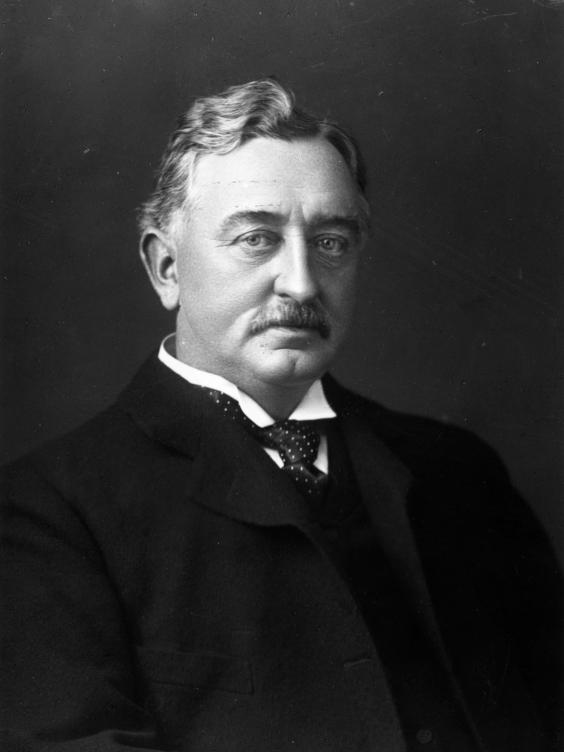 Cecil Rhodes Rhodes wanted to expand the British Empire because he believed that the Anglo-Saxon race was destined to greatness.[10] In what he described as "a draft of some of my ideas" written in 1877 while a student at Oxford, Rhodes said of the English, "I contend that we are the first race in the world, and that the more of the world we inhabit the better it is for the human race. I contend that every acre added to our territory means the birth of more of the English race who otherwise would not be brought into existence."[57] Rhodes bemoaned that there was little land left to conquer and said "to think of these stars that you see overhead at night, these vast worlds which we can never reach. I would annex the planets if I could; I often think of that. It makes me sad to see them so clear and yet so far".[58] Furthermore Rhodes saw imperialism as a way to alleviate domestic social problems - "In order to save the 40,000,000 inhabitants of the United Kingdom from a bloody civil war, we colonial statesmen must acquire new lands to settle the surplus population, to provide new markets for the goods produced in the factories and mines. The Empire, as I have always said, is a bread and butter question. If you want to avoid civil war, you must become imperialists".[59] Rhodes wanted to develop a Commonwealth in which all of the British-dominated countries in the empire would be represented in the British Parliament.[60] Rhodes explicitly stipulated in his will that all races should be eligible for the scholarships.[61] It is said that he wanted to develop an American elite of philosopher-kings who would have the United States rejoin the British Empire. As Rhodes also respected and admired the Germans and their Kaiser, he allowed German students to be included in the Rhodes scholarships. He believed that eventually the United Kingdom (including Ireland), the US, and Germany together would dominate the world and ensure perpetual peace.[62][page needed] Rhodes's views on race have been debated; he supported the rights of indigenous Africans to vote,[63] but critics have labelled him as an "architect of apartheid"[64] and a "white supremacist", particularly since 2015.[34][65][66] According to Magubane, Rhodes was "unhappy that in many Cape Constituencies, Africans could be decisive if more of them exercised this right to vote under current law [referring to the Cape Qualified Franchise]," with Rhodes arguing that "the native is to be treated as a child and denied the franchise. We must adopt a system of despotism, such as works in India, in our relations with the barbarism of South Africa".[35] Rhodes advocated the governance of indigenous Africans living in the Cape Colony "in a state of barbarism and communal tenure" as "a subject race. I do not go so far as the member for Victoria West, who would not give the black man a vote. ... If the whites maintain their position as the supreme race, the day may come when we shall be thankful that we have the natives with us in their proper position."[63] He once stated "I prefer land to niggers" and referred to the 'Anglo-Saxon race' as "the best, most human, most honourable race the world possesses".[67] He thought that those lands which were occupied by the "most despicable specimens of human beings" should be inhabited by Anglo-Saxons.[68]  Rhodes by Mortimer Menpes, 1901 However others have disputed these views. For example, historian Raymond C. Mensing notes that Rhodes has the reputation as the most flamboyant exemplar of the British imperial spirit, and always believed that British institutions were the best. Mensing argues that Rhodes quietly developed a more nuanced concept of imperial federation in Africa, and that his mature views were more balanced and realistic. According to Mensing, "Rhodes was not a biological or maximal racist. Despite his support for what became the basis for the apartheid system, he is best seen as a cultural or minimal racist".[69] In a 2016 opinion piece for The Times, Oxford University professor Nigel Biggar argued that although Rhodes was a committed imperialist, the charges of racism against him are unfounded.[70] In a 2021 article, Biggar further argued that:[71] If Rhodes was a racist, he would not have enjoyed cordial relations with individual Africans, he would not have regarded them as capable of civilisation, and he would not have supported their right to vote at all. Nor would he have stipulated in his final will of July 1899 that the scholarships that would famously bear his name should be awarded without regard for “race”. And yet he did all these things. On domestic politics within Britain, Rhodes was a supporter of the Liberal Party.[1] Rhodes' only major impact was his large-scale support of the Irish nationalist party, led by Charles Stewart Parnell (1846–1891).[72] Rhodes worked well with the Afrikaners in the Cape Colony; he supported teaching Dutch as well as English in public schools. While Prime Minister of the Cape Colony, he helped to remove most of their legal disabilities.[62] He was a friend of Jan Hofmeyr, leader of the Afrikaner Bond, and it was largely because of Afrikaner support that he became Prime Minister of the Cape Colony.[73] Rhodes advocated greater self-government for the Cape Colony, in line with his preference for the empire to be controlled by local settlers and politicians rather than by London. Scholar and Zimbabwean author Peter Godwin, whilst critical of Rhodes, writes that he needs to be viewed via the prisms and cultural and social perspective of his epoch, positing that Rhodes "was no 19th-century Hitler. He wasn't so much a freak as a man of his time...Rhodes and the white pioneers in southern Africa did behave despicably by today's standards, but no worse than the white settlers in North America, South America, and Australia; and in some senses better, considering that the genocide of natives in Africa was less complete. For all the former African colonies are now ruled by indigenous peoples, unlike the Americas and the Antipodes, most of whose aboriginal natives were all but exterminated." Godwin goes on to say "Rhodes and his cronies fit in perfectly with their surroundings and conformed to the morality (or lack of it) of the day. As is so often the case, history simply followed the gravitational pull of superior firepower." |
政治的見解 セシル・ローズ ローズは、アングロサクソン民族は偉大になる運命にあると信じていたため、大英帝国の拡大を望んでいた。[10] ローズは、オックスフォード大学在学中の1877年に「私の考えの草案」として記した文章の中で、英国人について次のように述べている。「私は、我々が世 界で最初の民族であり、我々が住む世界が広がれば広がるほど、人類にとって良いことだと主張する。我々の領土が1エーカーでも増えることは、それ以外では 誕生しなかったであろう英国人の血統がさらに誕生することを意味する」と主張した。[57] 征服すべき土地がほとんど残っていないことを嘆き、ローズは「夜空に輝くこれらの星々を考えてみたまえ。我々には決して到達できない広大な世界だ。もし可 能なら、私は惑星を併合したい。私はよくそのことを考える。それらがはっきりと見えるのに、あまりにも遠いことが悲しくなる」と述べた。[58] さらに、ローズは帝国主義を国内の社会問題を緩和する手段と捉えていた。「4000万人の英国民を血みどろの内戦から救うためには、植民地政治家である我 々は、余剰人口を吸収するために新たな土地を獲得し、工場や鉱山で生産される商品の新たな市場を提供しなければならない。私が常に言っているように、帝国 とはまさにパンとバターの問題なのだ。内戦を回避したいのであれば、帝国主義者にならなければならない」と述べている。[59] ローズは、英連邦内のすべての英領国が英国議会に代表を送るような英連邦の発展を望んでいた。[60] ローズは遺言で、すべての民族が奨学金の対象となることを明確に規定した。[61] ローズは、アメリカを英連邦に再加入させる哲人王のアメリカエリートを育成することを望んでいたと言われている。また、ローズはドイツ人とドイツ皇帝を尊 敬し、賞賛していたため、ローズ奨学金にドイツ人学生を含めることを認めていた。彼は最終的には、アイルランドを含むイギリス、アメリカ、ドイツが世界を 支配し、恒久的な平和を確保できると信じていた。 人種に関するローズの見解は議論の的となっており、彼はアフリカ先住民の選挙権を支持していたが[63]、批評家からは「アパルトヘイトの設計者」 [64]、「白人至上主義者」というレッテルを貼られている。特に2015年以降はそうである。 マグバネによると、ローズは「多くのケープ選挙区において、現行法(ケープ有資格選挙権法)の下でより多くのアフリカ人が選挙権を行使すれば、アフリカ人 が決定権を持つことになることを不満に思っていた」とし、ローズは「原住民は子供として扱われ、選挙権を否定されるべきである。南アフリカの野蛮性との関 係においては、インドで機能しているような専制政治のシステムを採用しなければならない。」[35] ローズは、ケープ植民地に住む土着のアフリカ人たちを「野蛮で共同所有の状態にある」中で、「支配されるべき人種」として統治することを提唱した。私は、 黒人に投票権を与えないヴィクトリア西選出議員ほど極端ではない。... 白人が最高の人種としての地位を維持するならば、我々にとって、原住民が彼らにふさわしい地位にいることを感謝する日が来るかもしれない。」[63] 彼はかつて「私はニガーよりも土地を好む」と述べ、「アングロサクソン人種」を「世界で最も優れ、最も人間らしく、最も名誉ある人種」と呼んだ。[67] 彼は、「人間として最も卑しい存在」が占領している土地は、アングロサクソン人種が居住すべきであると考えていた。[68]  1901年、モートン・メンペスによるローズスの肖像画 しかし、これらの見解に異論を唱える者もいる。例えば、歴史家のレイモンド・C・メンシングは、ローズは英国帝国主義の精神の最も華々しい体現者として知 られており、常に英国の制度が最善であると信じていたと指摘している。メンシングは、ローズはアフリカにおける帝国連邦のより微妙な概念を静かに発展さ せ、彼の成熟した見解はよりバランスの取れた現実的なものだったと主張している。メンシングによると、「ローズは生物学的な、あるいは極端な人種差別主義 者ではなかった。アパルトヘイト制度の基礎となったものを支持していたにもかかわらず、彼は文化的な、あるいは最小限の差別主義者と見なされるのが最もふ さわしい」と述べている。[69] 2016年、オックスフォード大学の教授であるナイジェル・ビガーは、タイムズ紙への寄稿で、ローズは熱心な帝国主義者であったが、彼に対する人種差別主 義者という非難は根拠のないものであると主張した。[70] 2021年の記事で、ビガーはさらに次のように主張した。 もしローズが人種差別主義者であったならば、彼は個々のアフリカ人たちと友好的な関係を築くことはなかっただろうし、彼らを文明化できる存在とはみなさな かっただろうし、彼らの選挙権を一切支持しなかっただろう。また、1899年7月の彼の遺言で、彼の名を冠した奨学金は「人種」を考慮せずに授与されるべ きだと定めることもなかっただろう。しかし、彼はこれらのことをすべて行った。 英国の国内政治に関しては、ローズは自由党の支持者であった。[1] ローズが与えた唯一の大きな影響は、チャールズ・スチュワート・パーネル(1846年-1891年)が率いるアイルランド民族党への大規模な支援であった。[72] ローズはケープ植民地のオランダ系住民と良好な関係を築き、公立学校では英語だけでなくオランダ語の授業も支持した。ケープ植民地首相在任中、彼は彼らの 法的障害のほとんどを取り除くのに貢献した。[62] 彼はアフリカーナー連合の指導者ヤン・ホフマイヤーの友人であり、彼がケープ植民地首相となったのは、アフリカーナーの支援があったからである。[73] ローズは、ケープ植民地に大きな自治を提唱し、それは、帝国はロンドンよりもむしろ現地の入植者や政治家によって統治されるべきだという彼の考えに沿うも のであった。 学者でジンバブエ人の作家であるピーター・ゴドウィンは、ローズを批判的に見ているが、ローズは「19世紀のヒトラーではない」と主張し、ローズを同時代 の文化や社会の視点から見る必要があると書いている。彼は変わり者というよりも、同時代の人間であった。...ローデスと南アフリカの白人開拓者たちは、 今日の基準では卑劣な行動を取っていたが、北米、南米、オーストラリアの白人入植者たちと比べても悪くはない。むしろ、アフリカにおける原住民の大量虐殺 がそれほど徹底的ではなかったことを考えると、彼らの方が優れていたと言える。なぜなら、かつてのアフリカ植民地はすべて、アメリカ大陸や南半球の植民地 とは異なり、先住民のほとんどが絶滅させられたわけではなかったからだ。 ゴドウィンはさらに次のように述べている。「ローズスと彼の取り巻きたちは、その環境に完璧に溶け込み、当時の道徳(あるいはその欠如)に順応していた。よくあることだが、歴史は単純に、より優れた火力の引力に従ったのだ。」 |
| Personal relationships Personal life Rhodes never married, pleading, "I have too much work on my hands" and saying that he would not be a dutiful husband.[74][page needed] Author Robin Brown has claimed in The Secret Society: Cecil John Rhodes’s Plan for a New World Order that Rhodes was a homosexual who was in love with his private secretary, Neville Pickering, and that he established "… a homosexual hegemony—which was already operative in the Secret Society—[and] went on to influence, if not control, British politics at the beginning of the twentieth century".[75] Paul Maylam of Rhodes University criticised the book in a review for The Conversation as "based heavily on surmise and assertion" and lacking "referenced source material to substantiate its claims", as well as being riddled with basic factual errors.[76] According to his personal banker, Lewis Mitchell, Rhodes "took, on occasions, a singularly human interest in the welfare of young men, and read their characters with discernment... Once, when twitted [teased] with his preference for young men, he retorted, 'Of course, of course, they must soon take up our work; we must teach them what to do and what to avoid.'" According to his secretary, Philip Jourdan, he "seemed to have a liking for young men" and was "particularly partial to people with blue eyes."[77][78] Graham Bower, the deputy to Sir Hercules Robinson, described Rhodes and Pickering's relationship as 'an absolutely lover-like friendship'.[79] Rhodes' biographers have been divided on the question of his sexuality. John Gilbert Lockhart and C.M. Woodhouse denied that Rhodes was homosexual, while Stuart Cloete and Antony Thomas took the view that he was asexual. Robert I. Rotberg and Brian Roberts have asserted that he was homosexual.[78] According to Rotberg, that Rhodes was homosexual is "indisputable on the basis of the available evidence."[80] Princess Radziwiłł In the last years of his life, Rhodes was stalked by Polish princess Catherine Radziwiłł, born Rzewuska, who had married into the noble Polish family Radziwiłł. The princess falsely claimed that she was engaged to Rhodes, and that they were having an affair. She asked him to marry her, but Rhodes refused. In reaction, she accused him of loan fraud. He had to go to trial and testify against her accusation. She wrote a biography of Rhodes called Cecil Rhodes: Man and Empire Maker.[81][page needed] Her accusations were eventually proven to be false.[82] |
個人的な関係 私生活 ローズは結婚せず、「仕事が多すぎる」と弁明し、良き夫にはなれないと述べていた。[74][要出典] 作家のロビン・ブラウンは著書『秘密結社: セシル・ジョン・ローズが、秘書のネヴィル・ピカリングと愛し合う同性愛者であり、また「...同性愛者の覇権を確立した。それは秘密結社においてすでに 機能していた。そして、20世紀初頭の英国政治に影響を与え、支配はしなかったものの、その影響力は続いた」と主張している。。ポール・メイラムはローズ 大学の教授であり、著書『ザ・カンバセーション』の書評でこの本を「推測と主張に大きく基づいている」と批判し、「主張を裏付ける参照資料」が欠けている と述べた。また、基本的な事実誤認も数多くあると指摘した。 彼の個人担当銀行員であるルイス・ミッチェルによると、ローズは「時に、若い男性の福祉に対して並外れた関心を示し、彼らの性格を洞察力を持って読んでい た... 若い男性を好むことをからかわれたとき、彼は『もちろん、もちろん、彼らはすぐに我々の仕事を継承しなければならない。我々は彼らに何をすべきか、何を避 けるべきかを教えなければならない』と反論した」という。秘書のフィリップ・ジャーダンによると、ローズは「若い男性が好きだったようで」、特に「青い目 の人が好きだった」という。[77][78] ヘラクレス・ロビンソン卿の副官であったグラハム・バウワーは、ローズとピカリングの関係を「完全に恋人同士のような友情」と表現した。[79] ローズの伝記作家たちは、彼の性的指向について意見が分かれている。ジョン・ギルバート・ロックハートとC.M.ウッドハウスはローズが同性愛者であった ことを否定しているが、スチュアート・クロエテとアントニー・トーマスは彼が無性愛者であったという見解を示している。ロバート・I・ロトバーグとブライ アン・ロバーツは、彼が同性愛者であったと主張している。[78] ロトバーグによると、ローズが同性愛者であったことは「入手可能な証拠から見て疑う余地がない」という。[80] ラジヴィウ王女 晩年、ローズはポーランドの貴族ラジヴィウ家の生まれで、後にラジヴィウ家と結婚したカタジナ・ラジヴィウ(旧姓レヴェウスカ)に付きまとわれていた。王 女はローズと婚約しており、不倫関係にあると虚偽の主張をした。王女はローズに結婚を申し込んだが、ローズは拒否した。それに対して、彼女は彼を融資詐欺 で告発した。彼は裁判に出頭し、彼女の告発に反論する証言をしなければならなかった。彼女はセシル・ローズの伝記『セシル・ローズ:帝国建設者』を執筆し た。[81][要ページ番号] 彼女の告発は最終的に虚偽であることが証明された。[82] |
| Second Boer War Main article: Siege of Kimberley 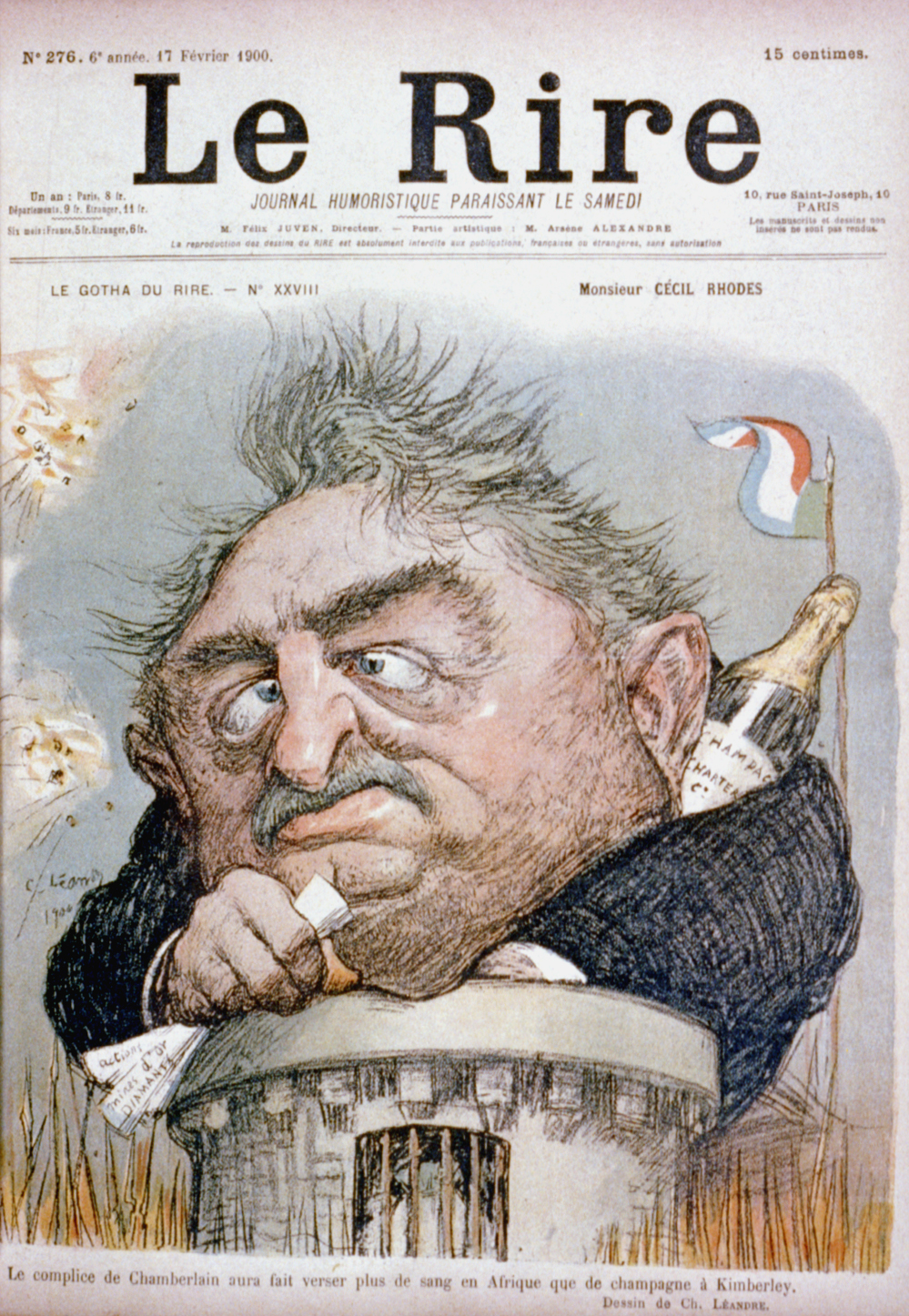 French caricature of Rhodes, showing him trapped in Kimberley during the Second Boer War, here peering from a tower clutching papers, with a champagne bottle behind his collar. During the Second Boer War Rhodes went to Kimberley at the onset of the siege, in a calculated move to raise the political stakes on the government to dedicate resources to the defence of the city. The military felt he was more of a liability than an asset and found him intolerable. The officer commanding the garrison of Kimberley, Lieutenant Colonel Robert Kekewich, experienced serious personal difficulties with Rhodes because of the latter's inability to co-operate.[83][84] Despite these differences, Rhodes' company was instrumental in the defence of the city, providing water and refrigeration facilities, constructing fortifications, and manufacturing an armoured train, shells and a one-off gun named Long Cecil.[85] Rhodes used his position and influence to lobby the British government to relieve the siege of Kimberley, claiming in the press that the situation in the city was desperate. The military wanted to assemble a large force to take the Boer cities of Bloemfontein and Pretoria, but they were compelled to change their plans and send three separate smaller forces to relieve the sieges of Kimberley, Mafeking and Ladysmith.[86] |
ボーア戦争 詳細は「キンバリー包囲戦」を参照  キンバリー包囲戦でキンバリーに閉じ込められたローズを描いたフランスの風刺画。塔から書類を握りしめながら外をうかがうローズの姿が描かれており、襟の後ろにはシャンパンボトルが置かれている。 第二次ボーア戦争中、ローデスは包囲戦の開始時にキンバリーに向かった。これは、政府に政治的影響力を高め、都市の防衛に資源を投入させるための計算され た動きであった。軍部は、彼が戦力というよりもむしろ足手まといであると感じ、彼を耐え難い存在であると感じていた。キンバリーの駐屯地を指揮するロバー ト・ケケウィッチ中佐は、ローデスが協力できないために深刻な個人的な問題を抱えていた。 こうした相違にもかかわらず、ローズの会社は、水や冷蔵施設の提供、要塞の建設、装甲列車や砲弾、ロング・セシルと名付けられた単発砲の製造など、都市の防衛に大きく貢献した。 ローズは、自らの地位と影響力を利用して、キンバリー包囲網の打開を英国政府に働きかけた。彼は、キンバリー市の状況は絶望的であると報道機関に主張し た。軍部は、ボーア人の都市であるブルームフォンテーンとプレトリアを攻略するために大規模な軍勢を集結させようとしたが、計画を変更せざるを得なくな り、キンバリー、マフェキング、レディスミス包囲網の打開のために3つの別個の小規模な軍勢を派遣した。[86] |
Death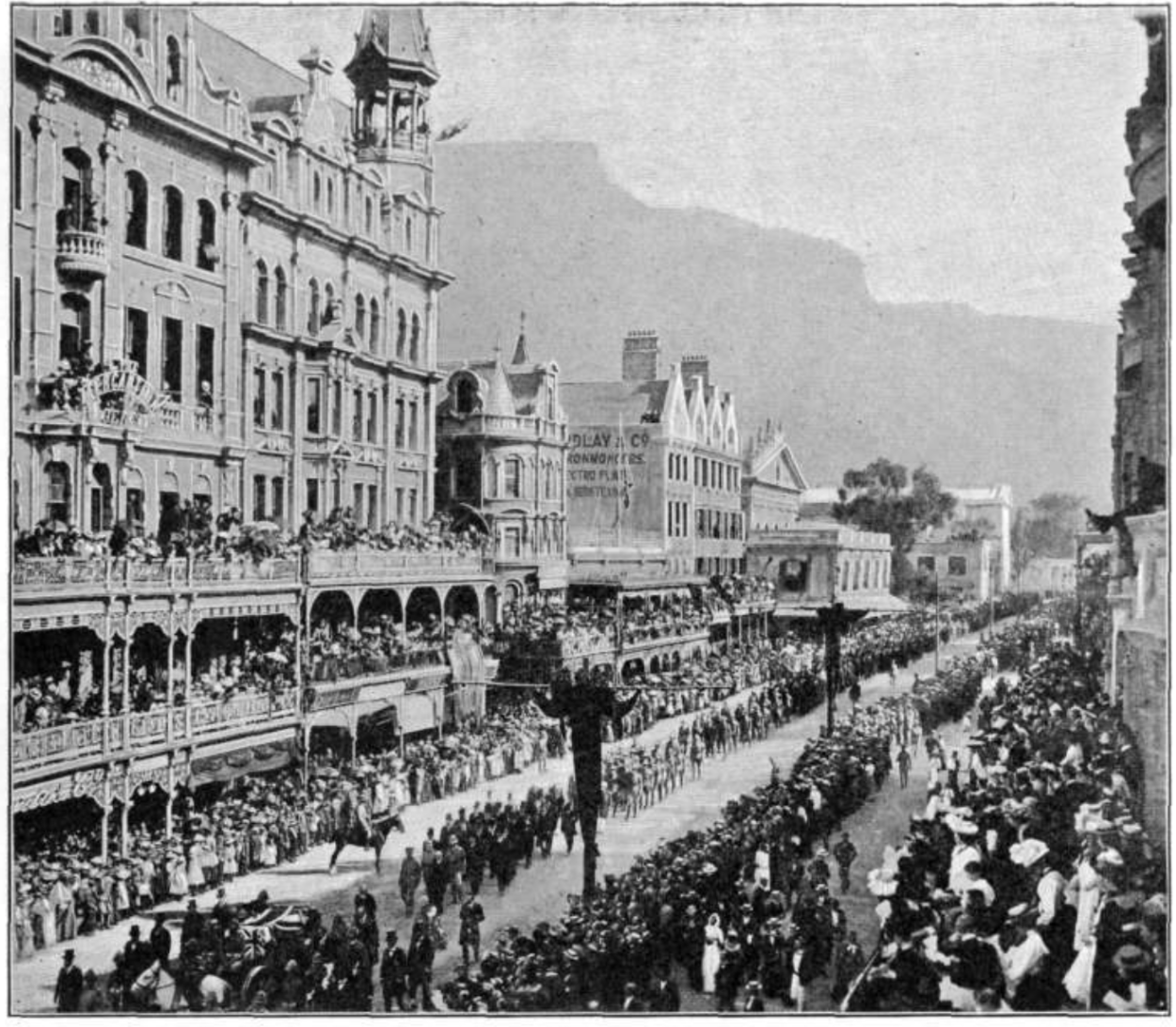 Funeral procession of Rhodes in Adderley Street, Cape Town, on 3 April 1902 Although Rhodes remained a leading figure in the politics of southern Africa, especially during the Second Boer War, he was dogged by ill health throughout his relatively short life. He was sent to Natal aged 16 because it was believed the climate might help problems with his heart. On returning to England in 1872, his health again deteriorated with heart and lung problems, to the extent that his doctor, Sir Morell Mackenzie, believed he would survive only six months. He returned to Kimberley where his health improved. From age 40 his heart condition returned with increasing severity until his death from heart failure in 1902, aged 48, at his seaside cottage in Muizenberg.[2] The government arranged an epic journey by train from the Cape to Rhodesia, with the funeral train stopping at every station to allow mourners to pay their respects. It was reported that at Kimberley, "practically the entire population marched in procession past the funeral car".[87] He was finally laid to rest at World's View, a hilltop located approximately 35 kilometres (22 mi) south of Bulawayo, in what was then Rhodesia.[88] Today, his gravesite is part of Matobo National Park, Zimbabwe. |
死 1902年4月3日、ケープタウンのアダーレー・ストリートでのローズスの葬列 ローズスは、特に第二次ボーア戦争中には南アフリカの政治の中心人物であり続けたが、比較的短い生涯を通じて病に苦しめられた。 16歳の時に、気候が心臓の問題に役立つかもしれないと考えられていたため、ナタールに送られた。1872年にイングランドに戻った際には、心臓と肺の問 題により健康状態が再び悪化し、主治医のモレル・マッケンジー卿は彼が6か月しか生きられないだろうと判断した。キンバリーに戻ると健康状態は回復した。 40歳を過ぎると心臓病が再発し、1902年、48歳でムジーンバーグの海辺のコテージで心不全により死去するまで病状は悪化の一途をたどった。 政府はケープタウンからローデシアまでの壮大な鉄道葬を準備し、葬列は沿線の各駅に停車し、弔問客が故人に敬意を表する機会が設けられた。キンバリーでは 「事実上、全住民が葬列に加わって葬儀列車の前を歩いた」と伝えられている。[87] 彼は最終的に、当時のローデシアの首都であったブルワヨの南約35キロメートル(22マイル)に位置する丘の上にあるワールドズ・ビューに埋葬された。 [88] 現在、彼の墓はジンバブエのマトボ国立公園の一部となっている。 |
Legacy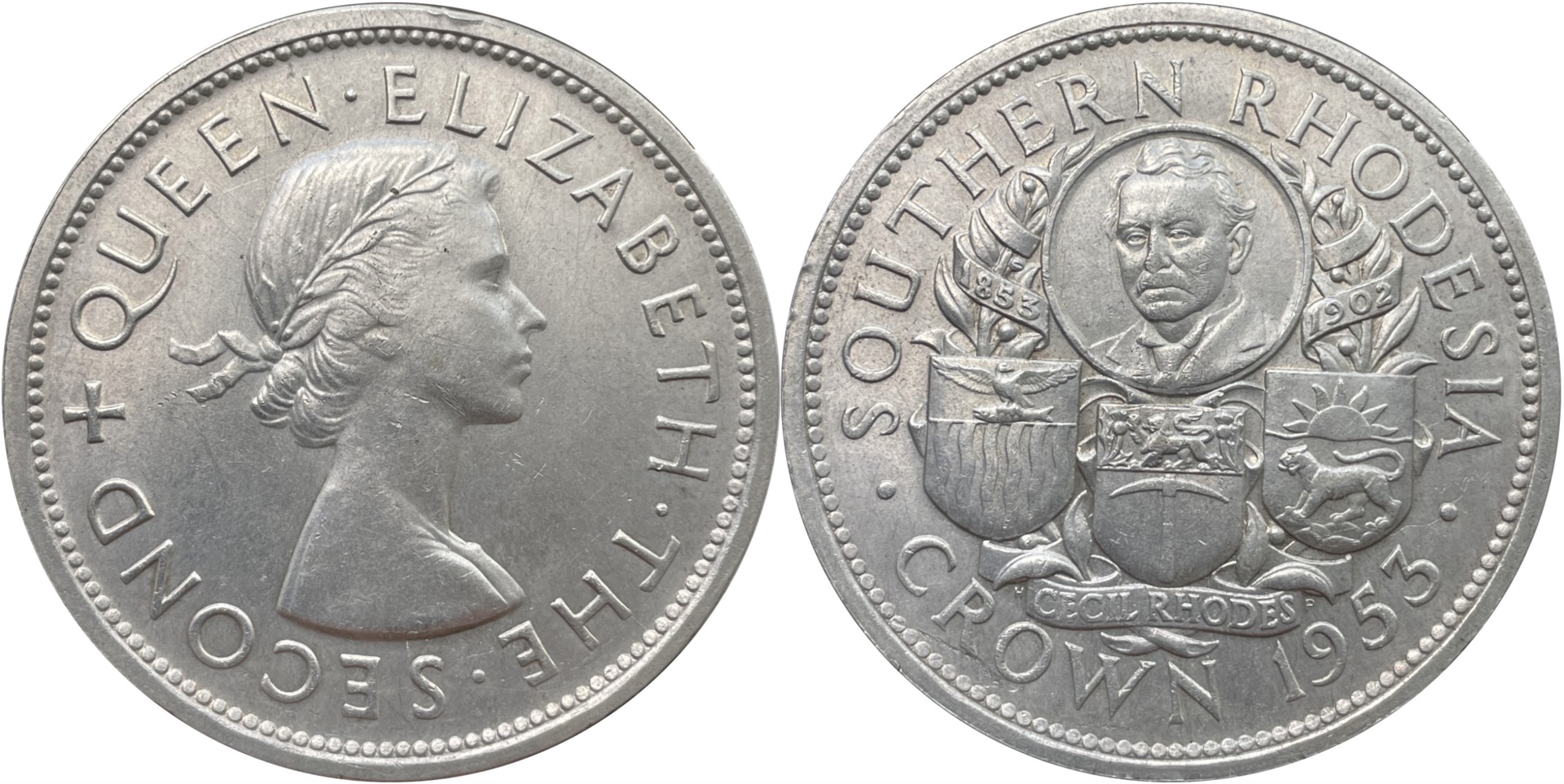 Silver coin: 1 crown Southern Rhodesia; Bust of Cecil John Rhodes, the Prime Minister of the Cape Colony, colonial magnate, and namesake of Southern Rhodesia, in a circle in the center and three shields for each colony developed by Rhodes, representing (from left to right) Northern Rhodesia, Southern Rhodesia, and Nyasaland below, all flanked by two wreaths wrapped in banners Rhodes has been the target of much recent criticism, with some historians attacking him as a ruthless imperialist and white supremacist.[89] The continued presence of his grave in the Matopos (now Matobo) hills has not been without controversy in contemporary Zimbabwe. In December 2010, Cain Mathema, the governor of Bulawayo, branded the grave outside the country's second city an "insult to the African ancestors" and said he believed its presence had brought bad luck and poor weather to the region.[90] In February 2012, Mugabe loyalists and ZANU-PF activists visited the grave site demanding permission from the local chief to exhume Rhodes's remains and return them to Britain. Many considered this a nationalist political stunt in the run up to an election, and Local Chief Masuku and Godfrey Mahachi, one of the country's foremost archaeologists, strongly expressed their opposition to the grave being removed due to its historical significance to Zimbabwe. Then-president Robert Mugabe also opposed the move.[52] In 2004, Rhodes was voted 56th in the SABC 3 television series Great South Africans.[91] A preparatory school in the Midlands town of Gweru in Zimbabwe is named after him. In the early 2000s during the height of the land reform and racial tensions, ZANU-PF politicians called for a change in all the country's school names with colonial ties, however, efforts were mostly fruitless as most people felt that it was unnecessary and names of places they live in reflect the diverse identity and cultural heritage of the country but called for the government to embrace the history of the country and allow room for new names for new places in the ever-growing towns and cities. In his second will, written in 1877 before he had accumulated his wealth, Rhodes wanted to create a secret society that would bring the whole world under British rule. His biographer calls it an "extensive fantasy."[92] Rhodes envisioned a secret society to extend British rule worldwide, including China, Japan, all of Africa and South America, and indeed the United States as well: To and for the establishment, promotion and development of a Secret Society, the true aim and object whereof shall be for the extension of British rule throughout the world, the perfecting of a system of emigration from the United Kingdom, and of colonisation by British subjects of all lands where the means of livelihood are attainable by energy, labour and enterprise, and especially the occupation by British settlers of the entire Continent of Africa, the Holy Land, the Valley of the Euphrates, the Islands of Cyprus and Candia, the whole of South America, the Islands of the Pacific not heretofore possessed by Great Britain, the whole of the Malay Archipelago, the seaboard of China and Japan, the ultimate recovery of the United States of America as an integral part of the British Empire, the inauguration of a system of Colonial representation in the Imperial Parliament which may tend to weld together the disjointed members of the Empire and, finally, the foundation of so great a Power as to render wars impossible, and promote the best interests of humanity.[93] — Cecil Rhodes Rhodes's final will—when he actually did have money—was much more realistic and focused on scholarships. He also left a large area of land on the slopes of Table Mountain to the South African nation. Part of this estate became the upper campus of the University of Cape Town, another part became the Kirstenbosch National Botanical Garden, while much was spared from development and is now an important conservation area.[94] South Africa's Rhodes University is named after him. Rhodes Scholarship Main article: Rhodes Scholarship 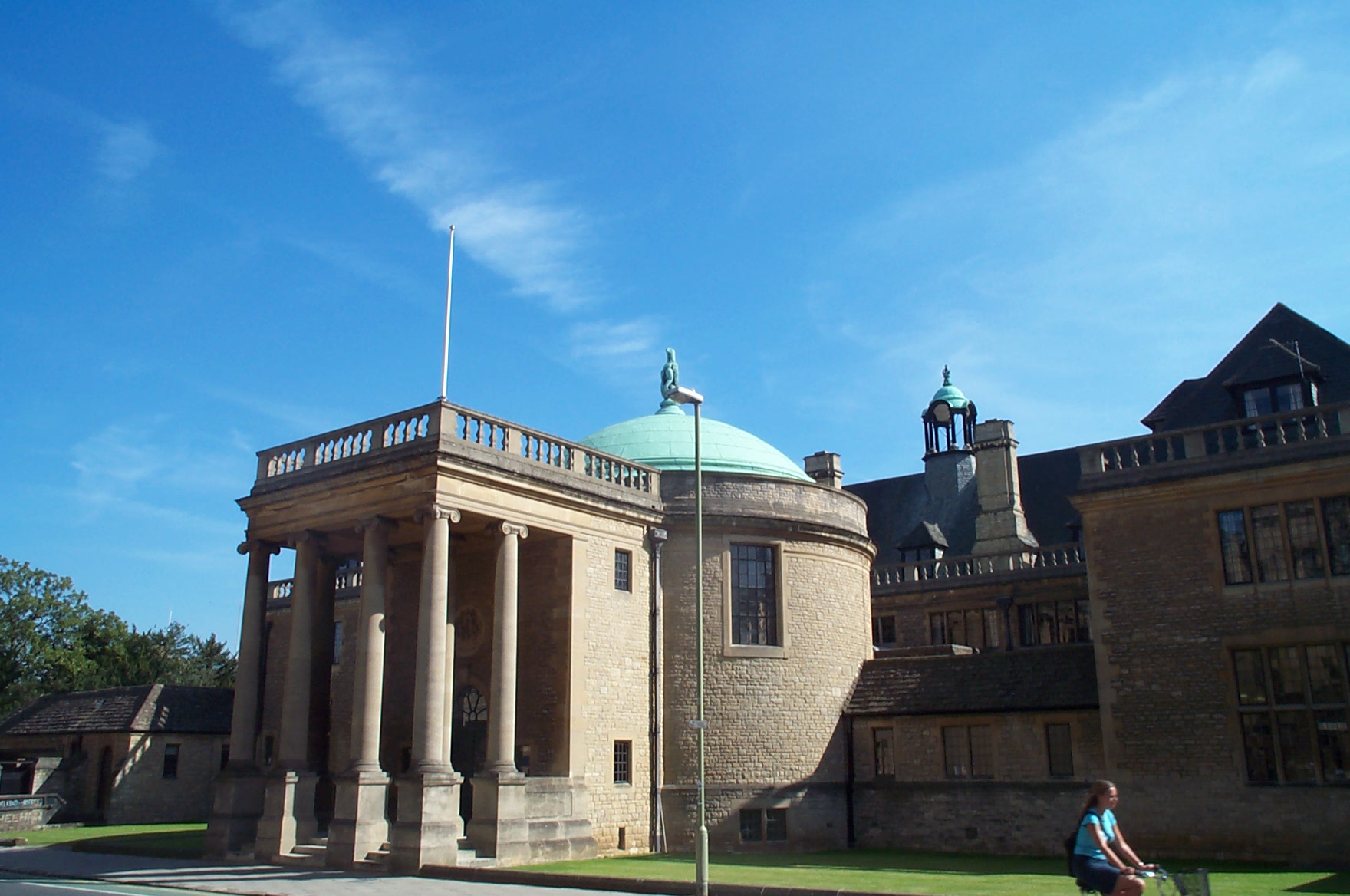 Rhodes House, Oxford, in 2004. In his last will, he provided for the establishment of the Rhodes Scholarship. Over the course of the previous half-century, governments, universities and individuals in the settler colonies had been establishing travelling scholarships for this purpose. The Rhodes awards fit the established pattern.[95] The scholarship enabled male students from territories under British rule or formerly under British rule and from Germany to study at Rhodes's alma mater, the University of Oxford. Rhodes' aims were to promote leadership marked by public spirit and good character, and to "render war impossible" by promoting friendship between the great powers.[96][97] Memorials  Rhodes Memorial at Devil's Peak (Cape Town).  Statue of Rhodes in Kimberley. Rhodes Memorial stands on Rhodes's favourite spot on the slopes of Devil's Peak, Cape Town, with a view looking north and east towards the Cape to Cairo route. From 1910 to 1984 Rhodes's house in Cape Town, Groote Schuur, was the official Cape residence of the prime ministers of South Africa and continued as a presidential residence. His birthplace was established in 1938 as the Rhodes Memorial Museum, now known as Bishops Stortford Museum. The cottage in Muizenberg where he died is a provincial heritage site in the Western Cape Province of South Africa. The cottage today is operated as a museum by the Muizenberg Historical Conservation Society, and is open to the public. A broad display of Rhodes material can be seen, including the original De Beers board room table around which diamonds worth billions of dollars were traded.[citation needed] Rhodes University College, now Rhodes University, in Grahamstown, was established in his name by his trustees and founded by Act of Parliament on 31 May 1904. The residents of Kimberley, Northern Cape elected to build a memorial in Rhodes's honour in their city, which was unveiled in 1907. The 72-ton bronze statue depicts Rhodes on his horse, looking north with map in hand, and dressed as he was when he met the Ndebele after their rebellion.[98] The founder of the original country of Rhodesia (now Zimbabwe), Cecil John Rhodes first visited Nyanga in the Eastern Highlands of the country in 1897. Captivated by the unspoilt and breathtaking beauty of the area, he immediately purchased a parcel of farms totalling 40,000 ha and then proceeded to import cattle from Mozambique and develop extensive plantations of apple and fruit trees. When he died in 1902, Rhodes bequeathed most of the estate to the nation, and this now forms the Nyanga National Park. Rhodes's original farmhouse has been meticulously preserved and is now the Rhodes Nyanga Hotel. Opposition 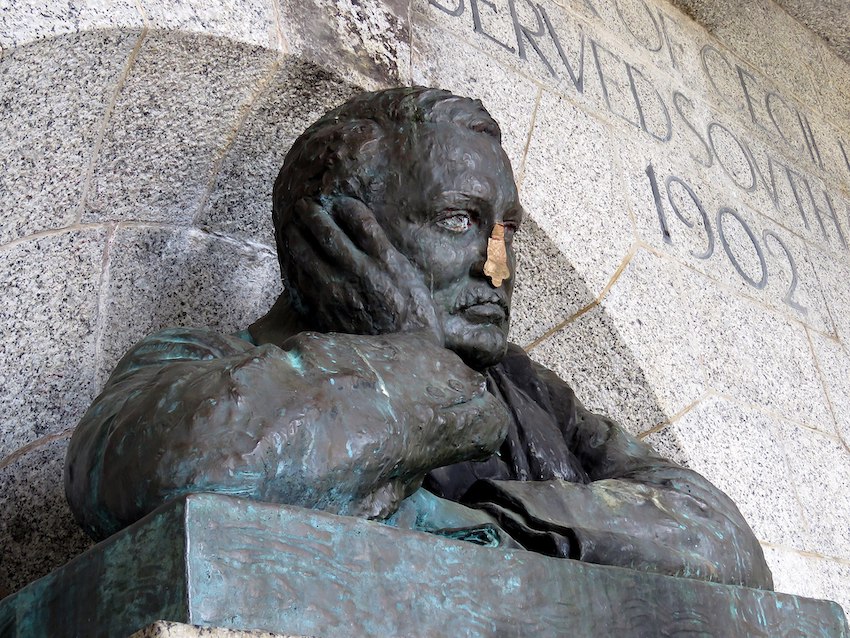 Noseless bust at the Rhodes Memorial, Cape Town Main article: Rhodes Must Fall Memorials to Rhodes have been opposed since at least the 1950s, when some Afrikaner students demanded the removal of a Rhodes statue at the University of Cape Town.[99] A 2015 movement, known as "Rhodes Must Fall" (or #RhodesMustFall on social media), began with student protests at the University of Cape Town that were successful in getting university authorities to remove the Rhodes statue from the campus.[100] The protest also had the broader goal of highlighting what the activists considered the lack of systemic post-apartheid racial transformation in South African institutions.[101] Following a series of protests and vandalism at the University of Cape Town, various movements both in South Africa and other countries have been launched in opposition to Cecil Rhodes memorials. These include a campaign to change the name of Rhodes University[102] and to remove a statue of Rhodes from Oriel College, Oxford.[103] The campaign was covered in a documentary by Channel 4, which was called The Battle for Britain's Heroes.[104] The documentary was commissioned after Afua Hirsch wrote an article on the topic. Moreover, an article by Amit Chaudhuri, in The Guardian, suggested the criticism was "unsurprising and overdue".[105] Other academics including Kehinde Andrews, prominent British academic and author specialising in Black studies, have vocally spoken in favour of #RhodesMustFall.[44] However, Oriel College opted to keep the Rhodes statue, despite the protests.[106] Oriel College claimed in 2016 they would lose about £100 million worth of gifts if they removed the statue.[107] Nevertheless, in June 2020, the college voted in favour of setting up an independent commission of inquiry, amid widespread support for removing the statue.[108] A statue of Rhodes was erected in the city of Bulawayo in 1904 in the city centre. In 1981 after the country's independence the statue was removed to the centenary park at the Natural History Museum of Zimbabwe. Encyclopædia Britannica, discussing his legacy, wrote of Rhodes that he "once defined his policy as 'equal rights for every white man south of the Zambezi' and later, under liberal pressure, amended 'white' to 'civilized'. But he probably regarded the possibility of native Africans becoming 'civilized' as so remote that the two expressions, in his mind, came to the same thing."[109] As part of his legacy, on his death Rhodes left a significant amount of money to be used to finance talented young scholars ("race" was not a criterion) at Oxford. Currently, in Oxford a number of those South African and Zimbabwean recipients of funds from his legacy are campaigning for his statue to be removed from display in Oxford. When asked if there was any double standard or hypocrisy in being funded by the Rhodes Scholarship fund and benefiting from the opportunity, whilst at the same time campaigning against the legacy of Rhodes, one of the South African campaigners, Ntokozo Qwabe, replied that "this scholarship does not buy our silence...There is no hypocrisy in being a recipient of a Rhodes scholarship and being publicly critical of Cecil Rhodes and his legacy... There is no clause that binds us to find 'the good' in Rhodes’ character, nor to sanitise the imperialist, colonial agenda he propagated".[110] In June 2020, amid the wider context of Black Lives Matter protests, the governing body of Oxford's Oriel College voted to remove the statue of Rhodes located on the college's façade facing Oxford's High Street.[111] The actual removal was not to take place until at least early spring 2021, when a commission set up by the college delivered its report on the future of the statue.[112] In May 2021, the commission reported that, while the majority of members supported the statue's removal, the costs to do so were prohibitively high, and the college would therefore not be taking action.[113] |
レガシー 銀貨:1クラウン 南ローデシア;中央にケープ植民地首相、実業家、南ローデシアの名前の由来であるセシル・ジョン・ローズの胸像、その周りにローズが開発した各植民地の3 つの盾(左から右に)北ローデシア、南ローデシア、ニヤサランド、すべてに2つの花輪が旗に巻かれている ローズは、非情な帝国主義者であり白人至上主義者であるとして、一部の歴史家から批判の的となっている。[89] マトポス(現マトボ)の丘にある彼の墓が現在も残っていることについては、現代のジンバブエでは議論の余地がある。2010年12月、ムガベ大統領の出身 地である第二の都市であるハラレのカイン・マテマ知事は、この墓を「アフリカの祖先に対する侮辱」と非難し、この墓があることで地域に不運と悪天候がもた らされていると述べた。 2012年2月、ムガベの支持者とZANU-PFの活動家が墓を訪れ、地元の首長にローズの遺骨を掘り起こして英国に返還する許可を求めた。多くの人々 は、これは選挙を前にした民族主義的な政治的パフォーマンスだと考えた。地元の首長マスクと、ジンバブエで最も著名な考古学者の一人であるゴドフリー・マ ハチは、ジンバブエの歴史的重要性を理由に、墓を撤去することに強く反対した。当時の大統領ロバート・ムガベもこの動きに反対した。[52] 2004年、SABC 3のテレビ番組『Great South Africans』で、ローズは56位に選ばれた。[91] ジンバブエのグウェルの中等教育学校は、ローズにちなんで名付けられている。2000年代初頭、土地改革と人種的緊張が高まっていた時期に、ZANU- PFの政治家たちは植民地時代とのつながりを持つ国内の学校名の変更を求めたが、ほとんどの人が 必要ないと感じ、自分たちが住む地域の名称は、この国の多様なアイデンティティと文化遺産を反映しているが、政府にはこの国の歴史を受け入れ、成長を続け る都市や町に新しく誕生する地域には新しい名称を付ける余地を認めるよう求めた。 1877年に書かれた2つ目の遺言で、財産を蓄える前ローズは、全世界を英国の支配下に置く秘密結社を創設したいと望んでいた。彼の伝記作家はこれを「広 範な空想」と呼んでいる[92]。ローズは、中国、日本、アフリカ全土、南米、そして米国をも含む全世界に英国の支配を拡大する秘密結社を構想していた。 秘密結社の設立、促進、発展を目的とし、その真の目的は、英国の支配を世界中に拡大すること、英国からの移民制度を完成させること、そして、エネルギー、 労働、企業努力によって生活手段を獲得できるあらゆる土地において、英国国民による植民地化を促進すること、 特に、アフリカ大陸全体、聖地、ユーフラテス川流域、キプロス島とカンディア諸島、南米全体、英国がこれまで領有していなかった太平洋諸島、マレー諸島全 体、中国と日本の海岸線、 アメリカ合衆国を大英帝国の不可欠な一部として最終的に回復すること、帝国議会における植民地代表制度の創設により、ばらばらだった帝国の構成国を結びつ けること、そして最終的には、戦争を不可能にし、人類の利益を促進するほどの強大な国家を建設することである。[93] —セシル・ローズ ローズの遺言(実際には金銭があった場合)は、はるかに現実的で奨学金に焦点を当てたものだった。また、テーブルマウンテンの斜面に広大な土地を南アフリ カ共和国に残した。この遺産の一部はケープタウン大学のキャンパスとなり、別の一部はキルステンボッシュ国立植物園となった。また、多くの土地は開発を免 れ、現在では重要な保護地域となっている。 南アフリカのローズ大学は、彼にちなんで名付けられた。 ローズ奨学金 詳細は「ローズ奨学金」を参照  2004年のオックスフォード大学ローズ・ハウス 彼の遺言では、ローズ奨学金の設立が定められていた。入植地であった植民地では、半世紀にわたって政府、大学、個人がこの目的のために旅行奨学金を設立し ていた。ローズ奨学金は、この確立されたパターンに適合している。[95] この奨学金制度により、英国の植民地であった地域やかつて英国の植民地であった地域の男子学生、およびドイツの男子学生が、ローズの母校であるオックス フォード大学で学ぶことが可能となった。ローズの目的は、公共の精神と善良な人格を備えたリーダーシップを促進すること、そして大国間の友好を促進するこ とで「戦争を不可能にする」ことだった。[96][97] 記念物  ローズ記念碑(ケープタウン、デビルズ・ピーク)。  キンバリーにあるローズの銅像 ローズ記念館は、ローズのお気に入りの場所であったケープタウンのデビルズ・ピークの斜面にあり、ケープ・タウンからカイロを結ぶルートを北と東に望むこ とができる。1910年から1984年までは、ケープタウンのグロート・シュールにあるローズの家は南アフリカ共和国首相の公邸となり、その後大統領官邸 となった。 彼の生家は1938年にローズ記念博物館として開設され、現在はビショップス・ストートフォード博物館として知られている。 彼が亡くなったムゼンバーグの小屋は、南アフリカの西ケープ州の地方遺産となっている。現在、このコテージはミューゼンバーグ歴史保存協会によって博物館 として運営されており、一般公開されている。 数十億ドル相当のダイヤモンドが取引されたデ・ビアス社の重役会議室のテーブルのオリジナルなど、ローズ関連のさまざまな展示品を見ることができる。 グラハムズタウンにあるローズ大学(旧ローズ大学)は、彼の名を冠して彼の受託者によって設立され、1904年5月31日に議会制定法によって創設された。 キンバリー、ノーザンケープ州の住民は、彼らの都市にローズの名誉を称える記念碑を建てることを決定し、1907年に除幕式が行われた。重さ72トンの青 銅像は、ローズが馬にまたがり、地図を手に北の方角を見つめ、ンデベレ族の反乱後に彼らと会ったときの服装をしている姿を表現している。 ローデシア(現ジンバブエ)の建国者であるセシル・ジョン・ローズは、1897年に初めて同国東部高地のニャンガを訪れた。その地域の自然のままの息を呑 むような美しさに魅了された彼は、すぐに合計4万ヘクタールに及ぶ農場用地を購入し、モザンビークから牛を輸入してリンゴや果物の大規模な農園の開発に着 手した。1902年に彼が亡くなると、ローズは遺産のほとんどを国に遺贈し、これが現在のニャンガ国立公園となった。ローズの最初の農家は入念に保存さ れ、現在はローズ・ニャンガ・ホテルとなっている。 反対  ケープタウンのローズ記念館にある鼻のない胸像 詳細は「ローズ・マスト・フォール」を参照 ローズの記念碑は少なくとも1950年代から反対運動の対象となっており、当時、アフリカーナー系の学生の一部がケープタウン大学のローズ像の撤去を要求 した。[99] 2015年に始まった「ローズ・マスト・フォール」(またはソーシャルメディアでは#RhodesMustFall)と呼ばれる運動は、 )は、ケープタウン大学の学生による抗議運動から始まった。この運動は、大学当局にキャンパス内のローズ像の撤去を成功させたことで知られている。 [100] この抗議運動は、活動家がアパルトヘイト後の南アフリカの制度における体系的な人種的変革の欠如とみなしたものを強調するというより広範な目標も持ってい た。[101] ケープタウン大学での一連の抗議活動と破壊行為の後、南アフリカおよびその他の国々で、セシル・ローズの記念碑に反対するさまざまな運動が立ち上がった。 これには、ローズ大学の名称変更[102]や、オックスフォード大学オリエル・カレッジのローズの銅像撤去を求めるキャンペーン[103]も含まれる。こ のキャンペーンは、チャンネル4のドキュメンタリー番組『The Battle for Britain's Heroes』で取り上げられた。さらに、ガーディアン紙のアミット・チャウドゥリによる記事では、批判は「当然のことであり、遅すぎた」と指摘してい る。[105] ケヒンデ・アンドリューズをはじめとする他の学者たちも、黒人研究を専門とする著名な英国人学者であり作家でもある。彼らは、 #RhodesMustFallを支持する声を上げた。[44] しかし、オリアル・カレッジは抗議にもかかわらず、ローズの像を維持することを選択した。[106] オリアル・カレッジは、 2016年には、像を撤去すれば1億ポンド相当の寄付を失うことになるだろうと主張した。[107] それでも、2020年6月には、像の撤去を求める声が広がる中、大学は独立調査委員会の設置を賛成多数で可決した。[108] ローズの像は、1904年に市街地に建てられた。1981年に同国が独立した後、像はジンバブエ自然史博物館のセンテナリー・パークに移設された。 彼の遺産について論じた『ブリタニカ百科事典』は、ローズについて「かつて彼は『ザンベジ川以南のすべての白人に対して平等な権利を与える』という政策を 打ち出したが、後にリベラル派の圧力を受けて『白人』を『文明人』と修正した。しかし、おそらく彼はアフリカ原住民が『文明人』になる可能性は非常に低い と考えていたため、彼の頭の中ではこの2つの表現は同じ意味になっていた」と記している。 彼の遺産の一部として、死後、ローズはオックスフォードの才能ある若い学者(「人種」は基準とはならなかった)に多額の資金援助を行った。現在、オックス フォードでは、彼の遺産から資金援助を受けた南アフリカおよびジンバブエ出身の多数の人々が、彼の銅像をオックスフォードから撤去するよう運動している。 ローズ奨学金の資金援助を受け、その機会から恩恵を受けながら、同時にローズの遺産に反対する運動を行うことについて、二重基準や偽善があるかどうかを問 われた南アフリカの運動家の一人、ントコゾ・クワベ氏は、「この奨学金は私たちの沈黙を買っているわけではない。ローズ奨学金の受給者であり、セシル・ ローズとその遺産を公に批判することは偽善ではない。ローズの性格の「良い面」を見つけたり、彼が推進した帝国主義的、植民地主義的な計画を正当化したり することを強制する条項などない」と答えている。[110] 2020年6月、ブラック・ライブズ・マター運動の抗議活動が広がる中、オックスフォードのオリアル・カレッジの理事会は、オックスフォードのハイ・スト リートに面したカレッジのファサードに設置されたローズの像を撤去することを決議した。[111] 実際の撤去は、少なくとも2021年初春まで行われず、 大学が設置した委員会が像の将来に関する報告書を提出したためである。[112] 2021年5月、委員会は、大多数の委員が像の撤去を支持しているものの、撤去費用が法外に高額であるため、大学は措置を取らないと報告した。[113] |
| Popular culture Mark Twain's sarcastic summation of Rhodes ("I admire him, I frankly confess it; and when his time comes I shall buy a piece of the rope for a keepsake"), from Chapter LXIX of Following the Equator, still often appears in collections of famous insults.[114][b] He is depicted, along with other Cape notables, in the 1899 artwork Holiday Time in Cape Town by James Ford. The will of Cecil Rhodes is the central theme in the science fiction book Great Work of Time by John Crowley, an alternative history in which the Secret Society stipulated in the will was indeed established. Its members eventually achieve the secret of time travel and use it to restrain World War I and prevent World War II, and to perpetuate the world ascendancy of the British Empire up to the end of the twentieth century. The book contains a vivid description of Cecil Rhodes himself, seen through the eyes of a traveller from the future British Empire. In the British film Rhodes of Africa (1936, directed by Austrian filmmaker Berthold Viertel), Rhodes was portrayed by Canadian actor Walter Huston.[115] Rhodes is the unofficial mascot of Uncomfortable Oxford, an Oxford-based tour guide and history organisation which focuses on British imperial history. Much of their promotional material, tours and speeches all focus on Rhodes's statue outside of Oriel College, Oxford, and they were central to organising the 2020 Oxford Black Lives Matter protests following the murder of George Floyd.[116][117] Rhodes was played by Ferdinand Marian in the Nazi film Ohm Krüger (1941), where he—like all other British characters in the film—was presented as an outright villain. In 1901, Rhodes bought Dalham Hall, Suffolk. In 1902, Colonel Frank Rhodes erected the village hall in the village of Dalham, near Bury St Edmunds, to commemorate the life of his brother, who had died before taking possession of the estate. Rhodes was a peripheral but influential character in the historical novel The Covenant by James Michener. His memorial at Devil's Peak also served as a temple in The Adventures of Sinbad episode "The Return of the Ronin". The 1976 Hugh Masekela album Colonial Man has a song titled "Cecil Rhodes". Cecil Rhodes was the subject of a South African television mini-series, Barney Barnato, made in 1989 and first aired on SABC in early 1990. In 1996, BBC-TV made an eight-part television drama about Rhodes called Rhodes: The Life and Legend of Cecil Rhodes.[118] It was produced by David Drury and written by Antony Thomas. It tells the story of Rhodes' life through a series of flashbacks of conversations between him and Princess Catherine Radziwiłł and also between her and people who knew him. It also shows the story of how she stalked and eventually ruined him. In the serial, Cecil Rhodes is played by Martin Shaw, the younger Cecil Rhodes is played by his son Joe Shaw, and Princess Radziwiłł is played by Frances Barber. In the serial Rhodes is portrayed as ruthless and greedy. The serial also suggests that he was homosexual.[119] Countering the implication of Rhodes' homosexuality, historian and journalist Paul Johnson wrote that Rhodes had been falsely smeared by the programme, commenting: "In nine tendentious hours, Rhodes is to be presented as a corrupt and greedy money-grabber, a racist and paedophile, whose disgusting passion was to get his hands on young boys ... the BBC has spent £10m of our money putting together a farrago of exaggerations and smears about this great man." Peter Godwin said of the film that "it feels like a work overwhelmingly informed by malice, consistently seizing on the very worst interpretation of the man without really attempting to get under his skin. Rhodes was no 19th-century Hitler. He wasn't so much a freak as a man of his time." Rhodes features prominently in Wilbur Smith's Ballantyne series of novels, fictional stories based amongst real events in Rhodes' lifetime. Scientology founder L. Ron Hubbard (b. 1911) believed himself to be the literal reincarnation of Cecil Rhodes.[120][unreliable source?] Season 4, Episode 1 of the Bad Gays Podcast covers Rhodes' life.[121] |
大衆文化 マーク・トウェインによるローズの辛辣な総括(「私は彼を賞賛している。率直に告白しよう。そして、彼が亡くなったら、記念にロープの切れ端を買うつもり だ」)は、著書『赤道を追って』の第69章から引用されたもので、今でもよく知られた侮辱のコレクションに登場する。[114][b] 彼は、他のケープタウンの著名人とともに、1899年のジェームズ・フォードによる作品『ホリデー・タイム・イン・ケープタウン』にも描かれている。 セシル・ローズの遺言は、ジョン・クロウリーによるSF小説『時の大業』の中心テーマである。この小説は、ローズの遺言に記された秘密結社が実際に設立さ れたというオルタナティブ・ヒストリーである。そのメンバーは最終的にタイムトラベルの秘密を解明し、第一次世界大戦を阻止し、第二次世界大戦を回避し、 20世紀末まで大英帝国の世界的な優位を永続させるためにそれを利用する。この本には、未来の英帝国からの旅行者の目を通して見たセシル・ローズ自身の生 き生きとした描写が含まれている。 ローズは、1936年のイギリス映画『ローズ・オブ・アフリカ』(オーストリアの映画監督ベルトルト・フィアテル監督)では、カナダ人俳優ウォルター・ハストンによって演じられた。 ローズは、オックスフォードを拠点とするツアーガイド兼歴史団体「アンコンフォタブル・オックスフォード」の非公式マスコットである。この団体は、イギリ ス帝国の歴史に焦点を当てている。彼らの宣伝資料、ツアー、スピーチの多くは、オックスフォードのオリエル・カレッジの外にあるローズの像に焦点を当てて おり、ジョージ・フロイドの殺害に続く2020年のオックスフォードのブラック・ライブズ・マター抗議運動の組織化の中心となった。[116][117] ローズは、ナチス映画『オーム・クルーガー』(1941年)でフェルディナンド・マリアンによって演じられ、映画内の他のすべての英国人キャラクターと同様に、完全な悪役として描かれた。 1901年、ローズはサフォーク州ダルハム・ホールを購入した。1902年、大佐のフランク・ローズは、その土地を手に入れる前に亡くなった弟の生涯を記念して、ベリー・セント・エドモンズ近郊のダルハム村に村役場を建設した。 ローズは、ジェームズ・ミッチェナーの歴史小説『契約』では、周辺的な存在ではあるが影響力のある人物として描かれている。 また、デビルズ・ピークにある彼の記念碑は、テレビアニメ『シンドバッドの大冒険』のエピソード「浪士の帰還」では寺院として登場している。 1976年に発表されたヒュー・マセケラのアルバム『コロニアル・マン』には、「Cecil Rhodes」というタイトルの曲がある。 セシル・ローズは、1989年に制作され、1990年初頭に南アフリカ放送協会(SABC)で初めて放映された南アフリカのテレビミニシリーズ『バーニー・バーナート』の主題となった。 1996年には、BBC-TVがローズを題材とした8部構成のテレビドラマ『ローズ:セシル・ローズの生涯と伝説』を制作した。[118] デイヴィッド・ドルーリーが制作し、アントニー・トーマスが脚本を担当した。このドラマは、ローズとカタジナ・ラジヴィウ王女との会話、および王女とロー ズを知る人々との会話のフラッシュバックの連続を通して、ローズの生涯を描いている。また、王女がローズを追い詰めて最終的に破滅させた経緯も描かれてい る。この連続ドラマでは、セシル・ローズをマーティン・ショーが、若い頃のセシル・ローズを息子のジョー・ショーが、ラジヴィウ王女をフランシス・バー バーが演じている。この連続ドラマでは、ローズは冷酷で強欲な人物として描かれている。また、ローズは同性愛者であったとも示唆されている。[119] ローズの同性愛を示唆する内容に対して、歴史家でジャーナリストのポール・ジョンソンは、ローズは番組によって不当に中傷されたと反論し、次のように述べ ている。「9時間にわたるこの番組では、ローズは堕落し強欲な金儲け主義者、人種差別主義者、小児性愛者として描かれ、若い少年たちを手に入れようとする 嫌悪すべき情熱が描かれている。BBCは、この偉大な人物について誇張と中傷の寄せ集めを制作するために、我々の税金から1000万ポンドを費やしたの だ」と述べた。ピーター・ゴドウィンは、この映画について「悪意に圧倒された作品であり、彼の内面を理解しようとするのではなく、一貫して彼に対する最悪 の解釈に固執している」と述べた。 ローズは19世紀のヒトラーではない。 彼は異常者というよりも、その時代の人であった」と述べた。 ローズは、ウィルバー・スミスによる小説『バルタニー』シリーズで重要な役割を果たしている。この小説は、ローズの生涯における実際の出来事を基にしたフィクションである。 サイエントロジーの創設者L.ロンハバード(1911年生まれ)は、自身がセシル・ローズの文字通りの生まれ変わりであると信じていた。[120][信頼できない情報源? ] ポッドキャスト『Bad Gays』のシーズン4、エピソード1では、ローズの生涯が取り上げられている。[121] |
| https://en.wikipedia.org/wiki/Cecil_Rhodes |
リ ンク
文 献
そ の他の情報
Copyleft, CC, Mitzub'ixi Quq Chi'j, 1996-2099
☆
 ☆
☆